#emancipation both in.. life and career
Explore tagged Tumblr posts
Text
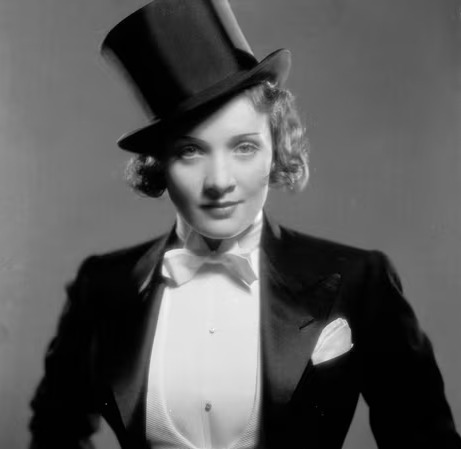
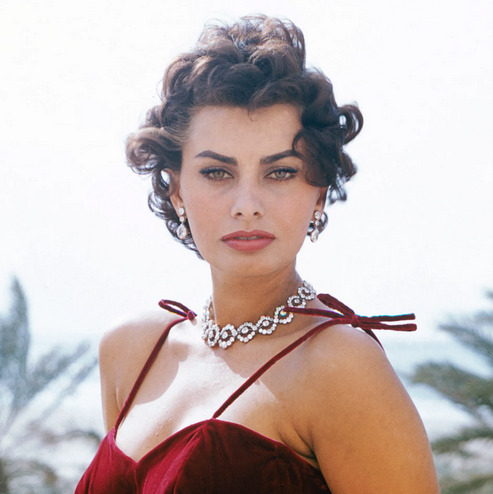
Propaganda
Marlene Dietrich (Shanghai Express, Witness for the Prosecution, Morocco)—Bisexual icon, super hot when dressed both masculine and feminine, lived up her life in the queer Berlin scene of the 1920s, central to the 'sewing circle' of the secret sapphic actresses of Old Hollywood, refused lucrative offers by the Nazis and helped Jews and others under persecution to escape Nazi Germany, the love of my life
Sophia Loren (Marriage Italian Style, Houseboat)—Major Italian star, first actress to win an Oscar for a performance not in English (for Two Women (1960)) and later when Roberto Benigni won an Oscar in 1999 he jumped over the chairs towards the stage going "Sophia Sophia!!" because he was running towards Sophia Loren and said he cared more about her than the Oscar, that's the effect she had on people. She was big in the 60s already even though she gained a lot more notoriety after that. And I mean. Can we take a moment and just.
This is round 6 of the tournament. All other polls in this bracket can be found here. Please reblog with further support of your beloved hot sexy vintage woman.
[additional propaganda submitted under the cut.]
Sophia Loren:
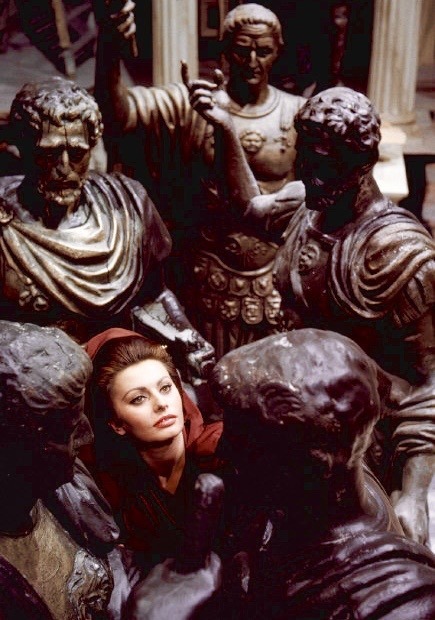
She has maxed out all her stats: beauty, elegance, sensuality, she's got it all. her mesmerizing eyes, her sensual mouth, her sharp face shape, her everything is so striking and unlike any other beauty in films. she was also voted the world most beautiful woman when she was freaking 65
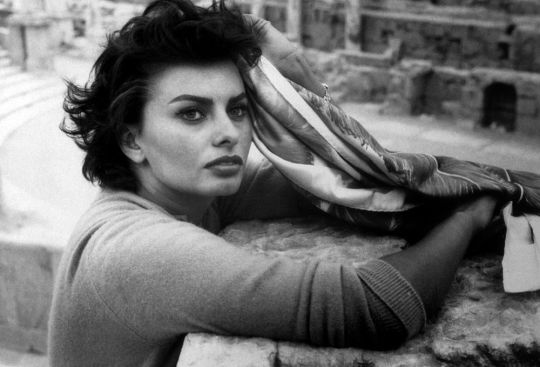
im submitting her in honor of my dad bc she was the first celebrity crush of his he ever admitted to me and my sister :) and he was right. shes so pretty
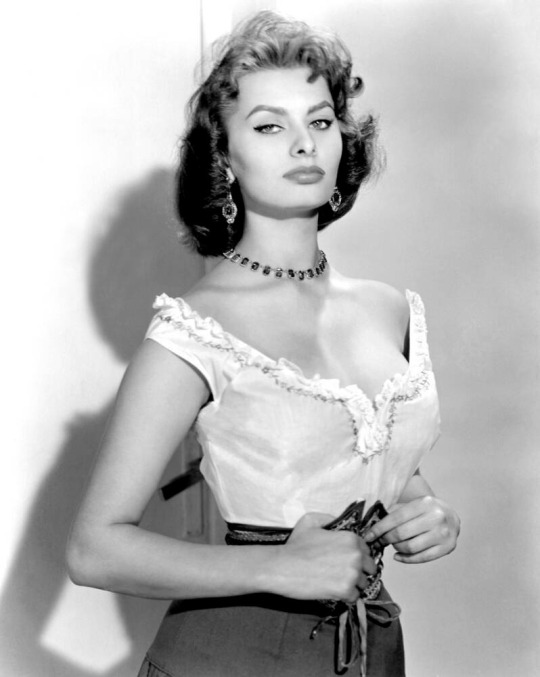
OSCAR WINNER. Worked with some of the hottest leading men in Hollywood but remained faithful to her husband whom she had a loving marriage with till he died (even though Cary Grant almost tempted her once, it's complicated)
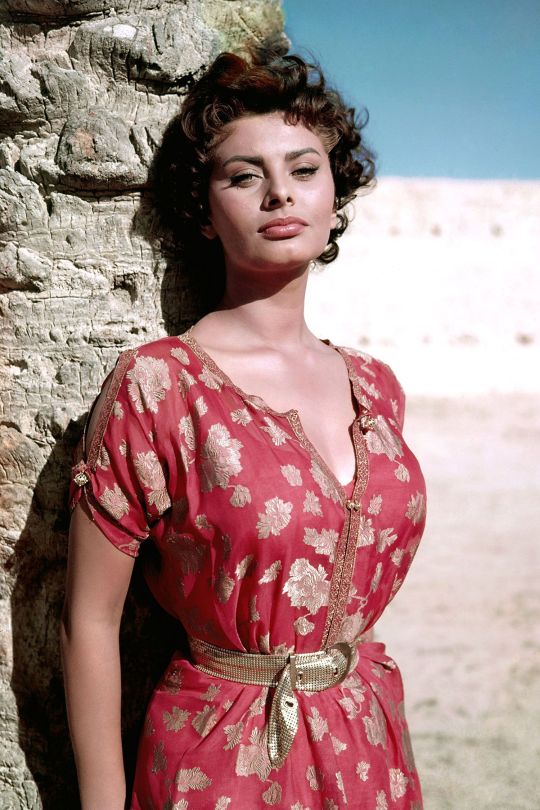
One of the most well-known sex symbols of the Golden Age of Hollywood, and unlike some unfortunate others, she seems to have been pretty well at peace with occupying that status. She made assertiveness and a tempestuous temper seem glamorous, and although she's famous for side-eying Jayne Manisfield's cleavage, honestly? She's one to talk.
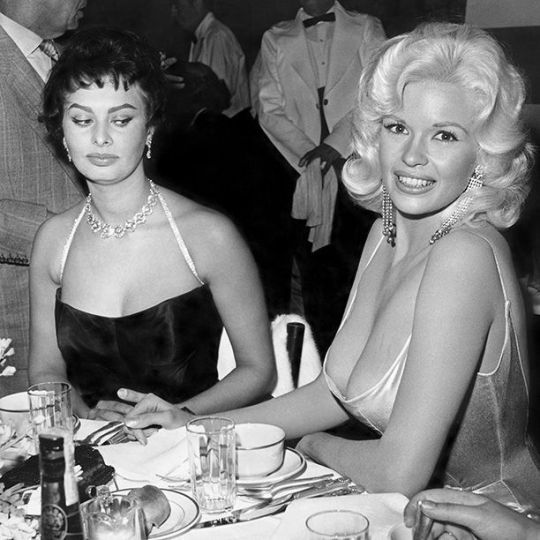
Absolutely, drop-dead sexy, also a hard working, extraordinarily talented actress who didn't shy away from the less glamorous roles to gift us some gritty, memorable performances
Submitting this on behalf of my dad, who knows nothing of tumblr or this blog, but I remember being a kid watching Houseboat while my mom thirsted after Cary Grant, dad thirsted after Sophia Loren, and I was excited that they lived on a boat. Anyway, she's extremely beautiful and was an international star, doing a ton of movies in Italy before being recognized in the US.
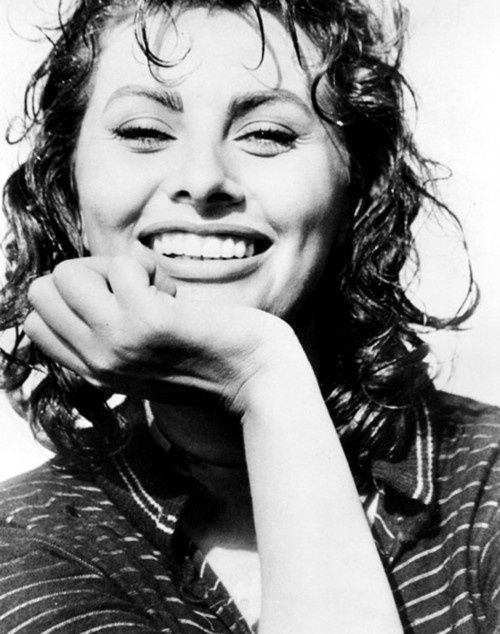
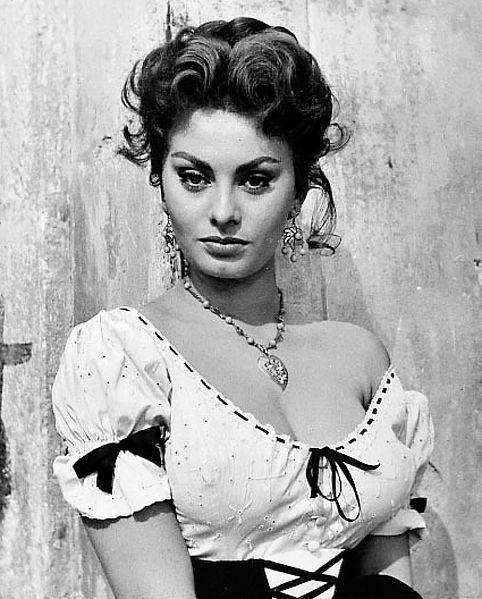
JUST LOOK AT HER Y'ALL
Very smart and beautiful, the characters that she played (I mean those in the movies that I put in the previous question) are as strong and determined as her which I think adds to her hotness.
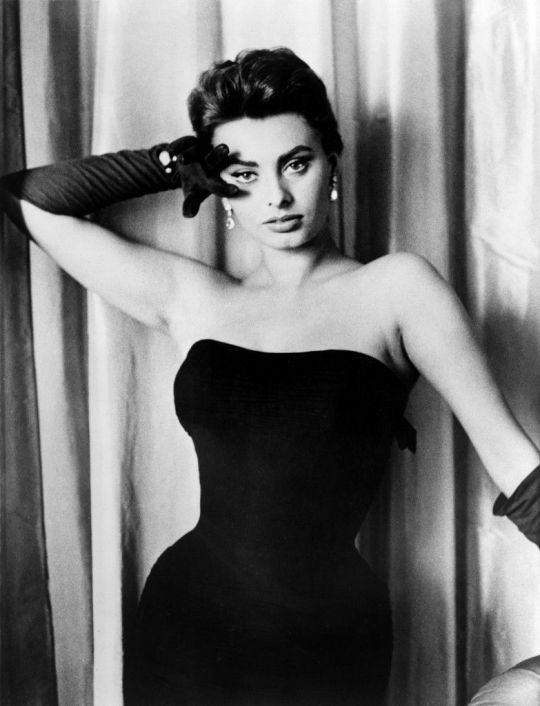
Global superstar and my late grandfather's long time movie star crush and for a man as quiet as he was, and as hopelessly devoted to his wife as he was, the fact that I know that means she was EXCEPTIONAL.
Big in the chest, snatched in the waist, pretty in the face 😳
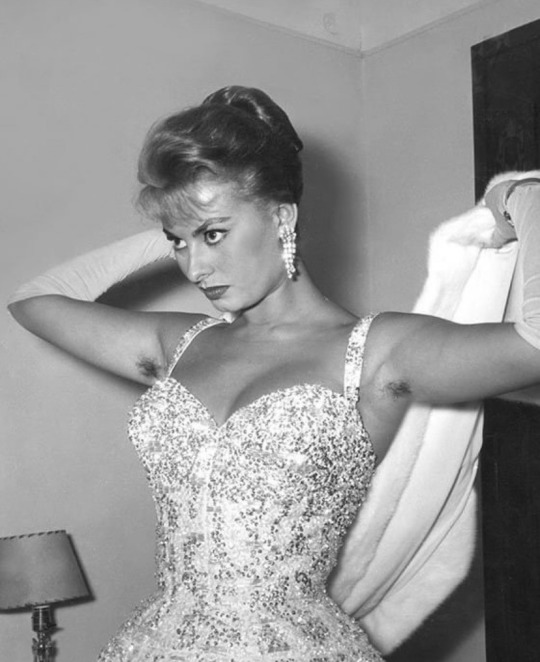
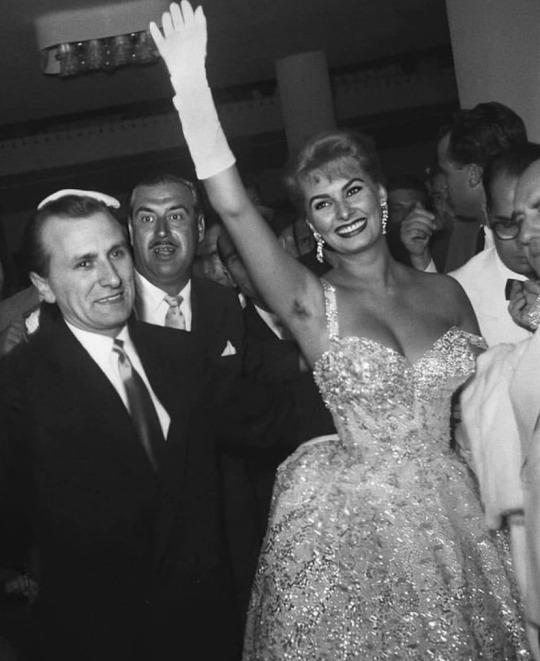
Sexy, beautiful, deep. A real star.
Her performance in "Man of La Mancha" is just so very captivating. Dubbed as "the Italian Marilyn Monroe", she looks beautiful in any movie and at any age.
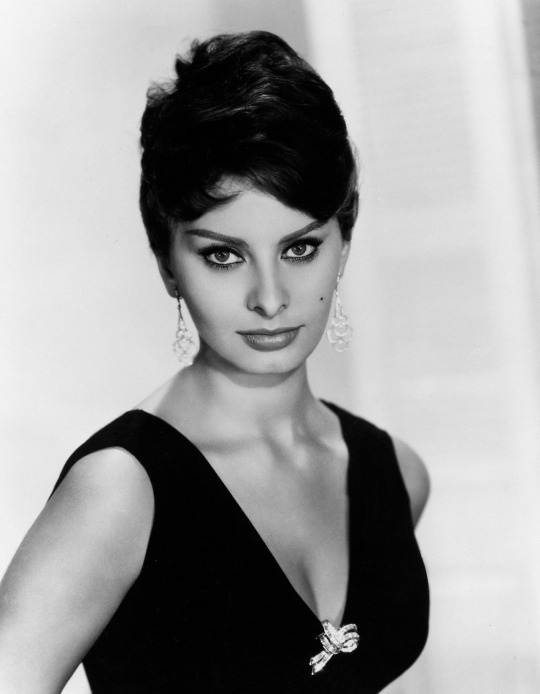
Forget the exotic sexpot of her Hollywood films and go back to her Italian career: sparking with Marcello Mastroianni as the woman who drives him mad and outwits all his fumbling attempts at macho posturing in their early films, and showing a tender side in their 1970s films. Sophia isn’t self-conscious about who she is or her beautiful body: she enjoys being herself and she wants us all to enjoy ourselves too.
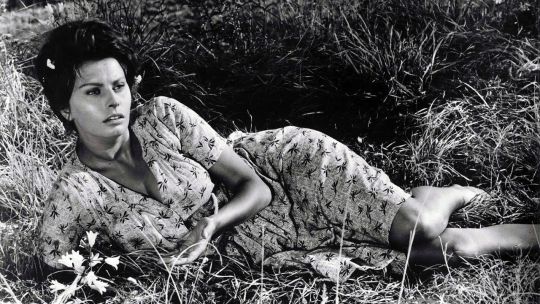
She starred in films as a sexually emancipated persona and was one of the best known sex symbols of the time. She is a great cook and her filmography is immense.
On the misattributed quote that Sophia owed everything to spaghetti: 'Did you actually say the quote frequently attributed to you, "Everything you see I owe to spaghetti"?' "Non è vero! It's not true! It's such a silly thing. I owe it to spaghetti, no, no. Completely made up."
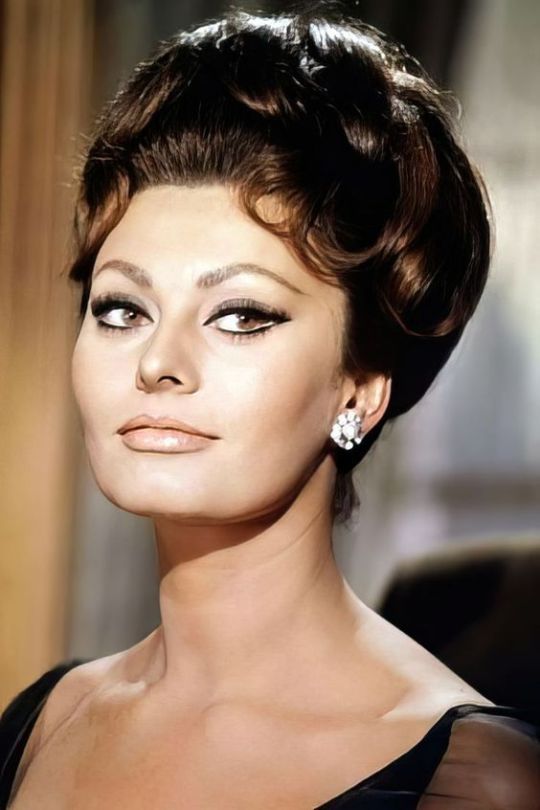
Marlene Dietrich:
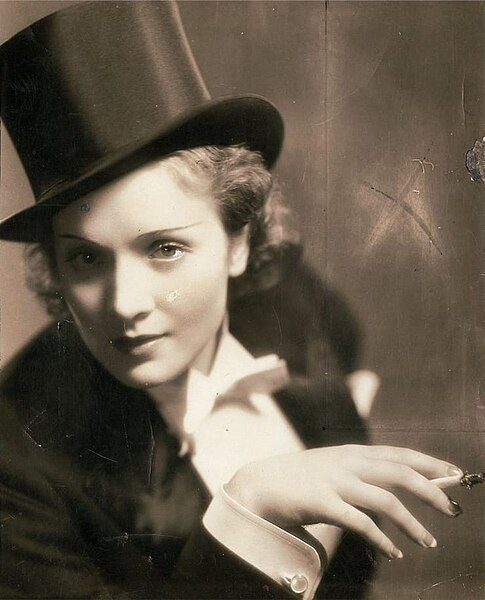
ms dietrich....ms dietrich pls.....sit on my face
its marlene dietrich!!!! queer legend, easily the hottest person to ever wear a tuxedo, that hot hot voice, those glamorous glamorous movies…. most famously she starred in a string of movies directed by josef von sternberg throughout the 1930s, beginning with the blue angel which catapulted her to stardom in the role of the cabaret singer lola lola. known for his exquisite eye for lighting, texture, imagery, von sternberg devoted himself over the course of their collaborations to acquiring exceptional skill at photographing dietrich herself in particular, a worthy direction in which to expend effort im sure we can all agree. she collaborated with many other great directors of the era as well, including rouben mamoulian (song of songs), frank borzage (desire), ernst lubitsch (angel), fritz lang (rancho notorious), and billy wilder (witness for the prosecution). the encyclopedia britannica entry im looking at while compiling this propaganda describes her as having an “aura of sophistication and languid sexuality” which✔️💯. born marie magdalene dietrich, she combined her first and middle names to coin the moniker “marlene”. she was a trendsetter in her incorporation of trousers, suits, and menswear into her wardrobe and her androgynous allure was often remarked upon. critic kenneth tynan wrote, “She has sex, but no particular gender. She has the bearing of a man; the characters she plays love power and wear trousers. Her masculinity appeals to women and her sexuality to men.” in the 1920s she enjoyed the vibrant queer nightlife of weimar berlin, visiting gay bars and drag balls, and in hollywood her love affairs with men and women were an open secret. she was an ardent opponent of nazi germany, refusing lucrative contacts offered her to make films there, raising money with billy wilder to help jews and dissidents escape, and undertaking extensive USO tours to entertain soldiers with an act that included her a playing musical saw and doing a mindreading routine she learned from orson welles. starting in the 50s and continuing into the mid-70s she worked largely as a cabaret artist touring the world to large audiences, employing burt bacharach as her musical arranger.
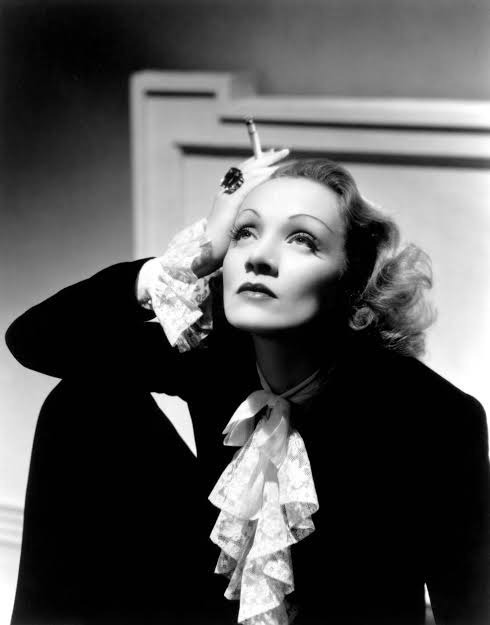
First of all, there are those publicity photos of her in a tux. Second of all, I have never been the same since knowing that she sent copies of those photos to her Berlin lovers signed "Daddy Marlene." Not only is she hot in all circumstances, but she can do everything from earthy to ice queen. Also, she kept getting sexy romantic lead parts in Hollywood after the age of 40, which would be rare even now. She hated Nazis, loved her friends, and had a sapphic social circle in Hollywood. She also had cheekbones that could cut glass and a voice that could melt you.
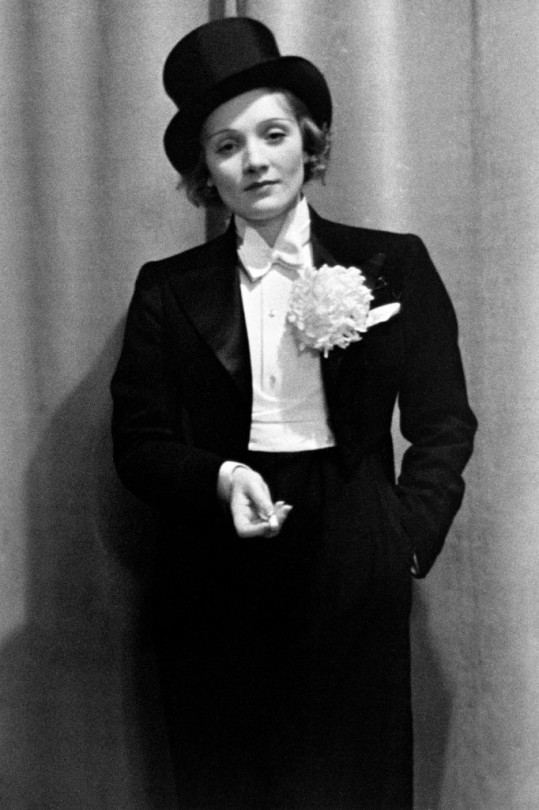
Her GENDER her looks her voice her everything
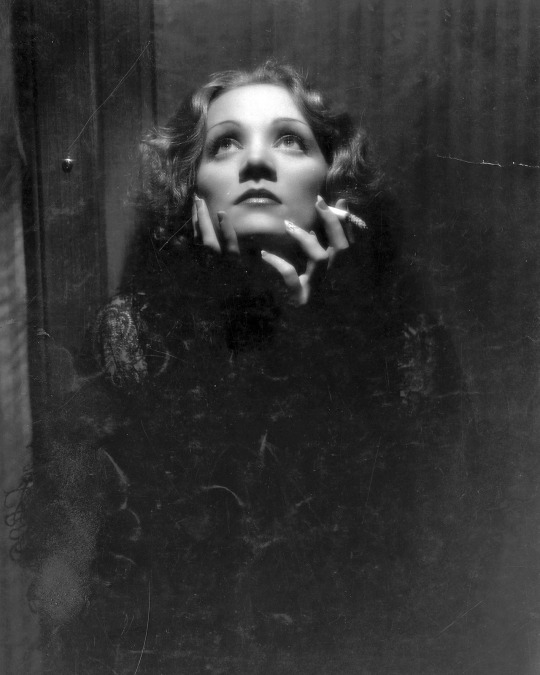
“In her films and record-breaking cabaret performances, Miss Dietrich artfully projected cool sophistication, self-mockery and infinite experience. Her sexuality was audacious, her wit was insolent and her manner was ageless. With a world-weary charm and a diaphanous gown showing off her celebrated legs, she was the quintessential cabaret entertainer of Weimar-era Germany.”
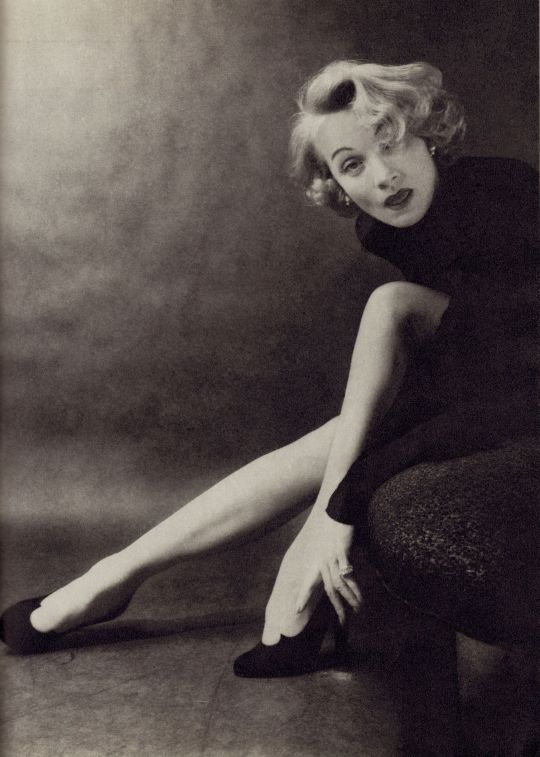
The bar scene in Morocco awoke something in me and ultimately changed my gender
youtube
"Her manner, the critic Kenneth Tynan wrote, was that of ‘a serpentine lasso whereby her voice casually winds itself around our most vulnerable fantasies.’ Her friend Maurice Chevalier said: ‘Dietrich is something that never existed before and may never exist again.’”
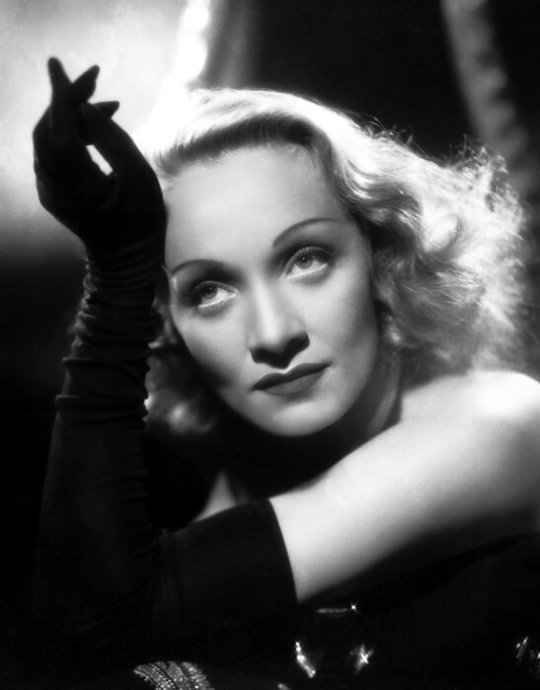
"Songstress, photographer, fashion icon, out bisexual phenom (notoriously stole Lupe Velez and Joan Crawford's men, and Errol Flynn's wife, had a torrid affair with Greta Garbo that ended in a 60-year feud, other notable conquests including Erich Maria Remarque -yes, the guy who wrote All Quiet on the Western Front- Douglas Fairbanks Junior, Claudette Colbert, Mercedes de Acosta, Edith Piaf), anti-Nazi activist. Marlene was a bitch - she had an open marriage for decades and one of her favorite things was making catty commentary about her current lover with her husband, and her relationship with her daughter was painful- but she was also immensely talented, a hard worker, an opponent of fascism and the hottest ice queen in Hollywood for a long time."
youtube
"She can sing! She can act! She told the Nazis to fuck off and became a US citizen out of spite! She worked with other German exiles to create a fund to help Jews and German dissidents escape (she donated an entire movie salary, about $450k, to the cause). She looks REALLY GOOD in a suit. If you're not convinced, please listen to her sing "Lili Marlene". Absolutely gorgeous woman with a gorgeous voice."
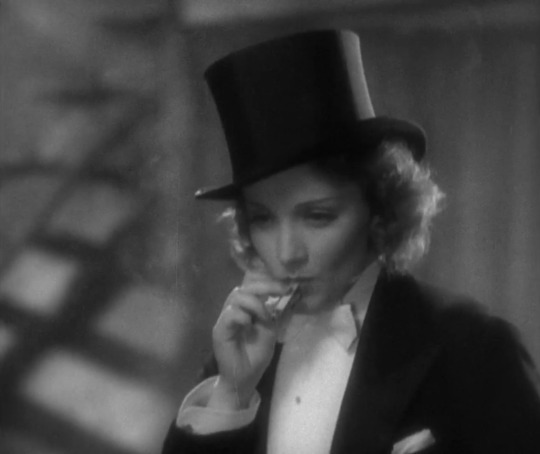
Gifset link
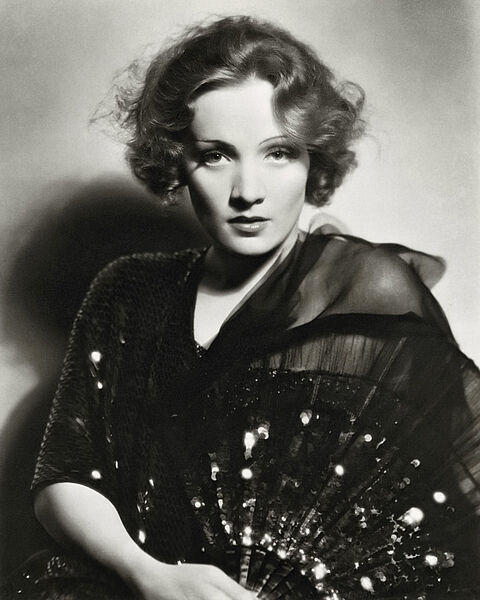
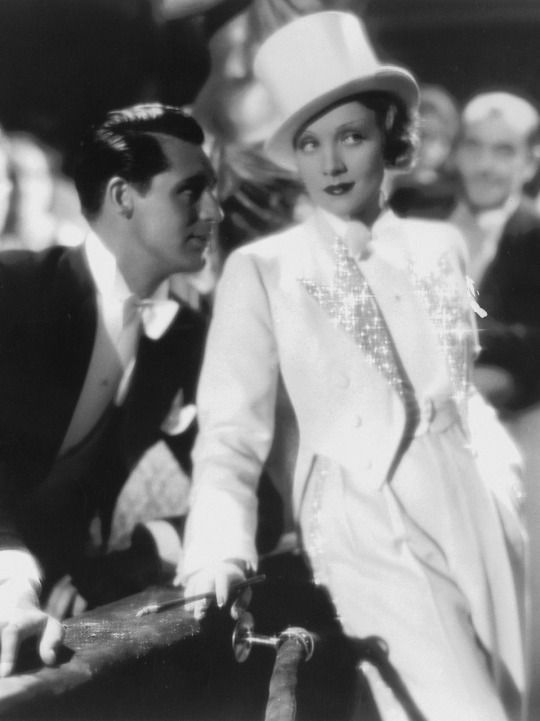
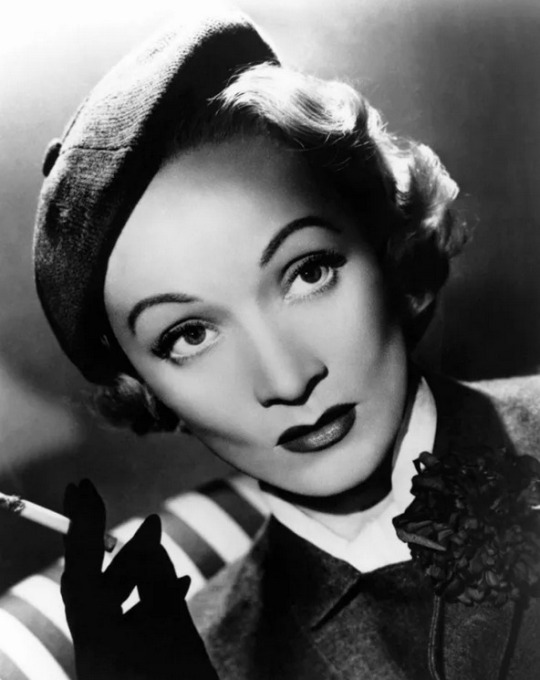
"Bisexual icon and Nazi-hater. Looks absolutely stunning in the suits she liked to wear. 'I dress for the image. Not for myself, not for the public, not for fashion, not for men'."
"would you not let her walk on you?"
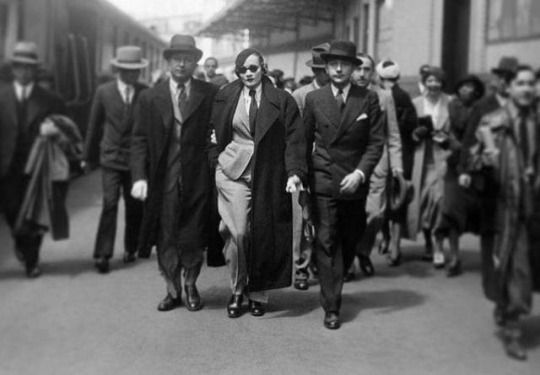
538 notes
·
View notes
Text
We as a society don't talk often about how the ending given to My Fair Lady by Hollywood is absolutely rubbish.
Eliza Doolittle from the start is shown as an independent woman who only wants to gain skills to further her career. Yes for a brief moment there she is attracted to Professor Higgins but I like to attribute it to proximity for a long period of time (6 months according to the wager) but after the Embassy Ball she calls Higgins out for his highhanded, misogynistic personality. Then why is she shown to go back to him to in the end?
George Bernard Shaw, writer of Pygmalion from which the plot of My Fair Lady is drawn up, protested the ending till 1938 that Eliza going back to Higgins is unacceptable to him and he gives a marvelous explanation for it
"When Eliza emancipates herself – when Galatea comes to life – she must not relapse. She must retain her pride and triumph to the end. When Higgins takes your arm on 'consort battleship' you must instantly throw him off with implacable pride; and this is the note until the final 'Buy them yourself.' He will go out on the balcony to watch your departure; come back triumphantly into the room; exclaim 'Galatea!' (meaning that the statue has come to life at last); and – curtain. Thus he gets the last word; and you get it too."
According to Shaw Eliza and Freddy get married and are happily running a green grocery-cum-flower shop, with Colonel Pickering providing them with funds for it. Freddy is truthfully a much better choice, yeah he is a himbo but he is kind, doesn't look down on Eliza and loves her for who she is unlike Higgins whose goal is to mould her into what a perfect woman is according to him.
Two well known versions of My Fair Lady are
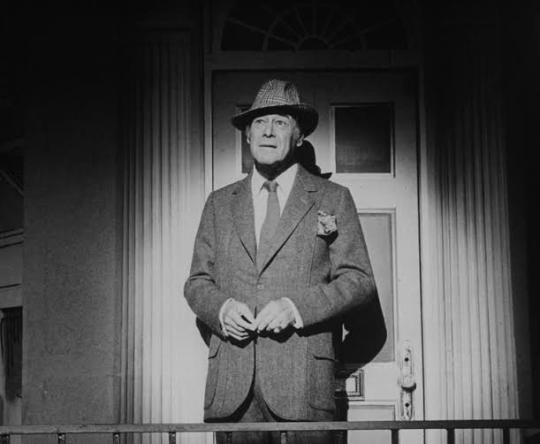

Rex Harrison plays Professor Higgins in both.
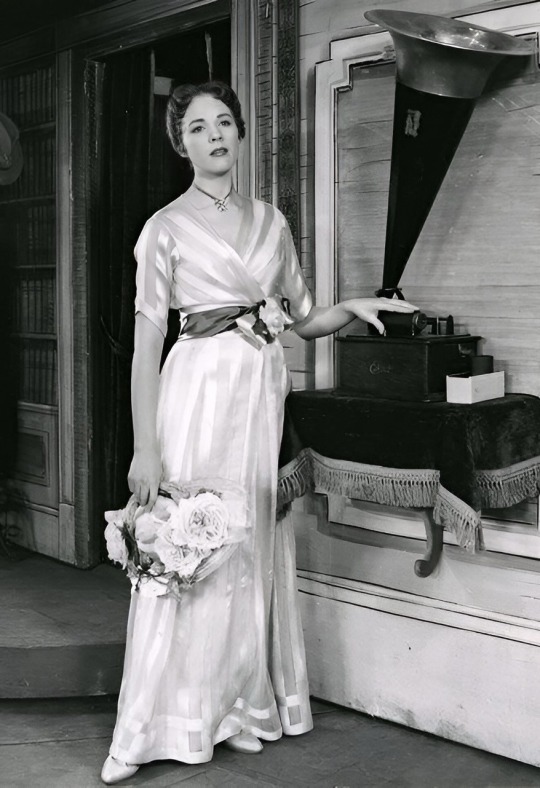
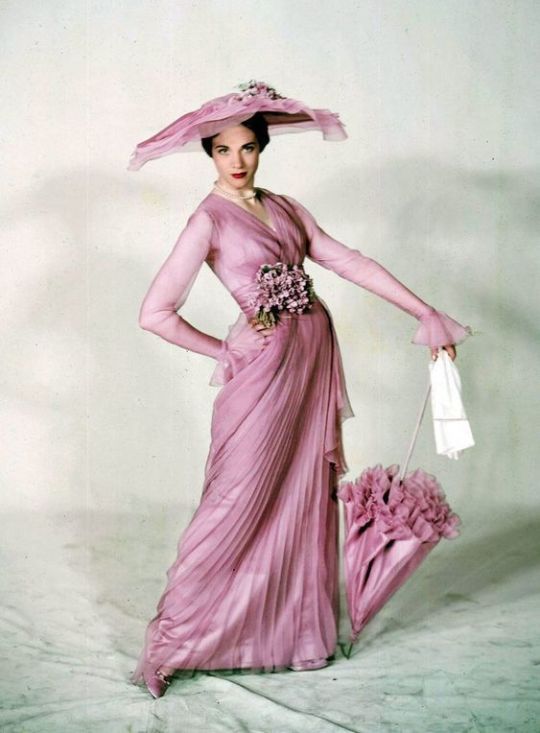
1) The Broadway version in 1956 starring the magnificent Julie Andrews (of Sound of Music, Mary Poppins, Victor Victoria, Princess Diaries, etc.) and John Michael King (from various musical theaters)
And


2) My Fair Lady 1964 starring the iconic Audrey Hepburn (of Sabrina, Breakfast at Tiffany's, Roman Holiday, Charade, etc.) Hepburn's father was a Nazi sympathizer but she danced to secretly raise money for the Dutch Resistance against the Nazis even though she was literally starving. Her mother and she also denounced their royal heritage because of the Nazis in the family. She was a UNICEF ambassador and continued to do humanitarian work even while diagnosed with cancer.
Not sorry for getting sidetracked, I am sick of people remembering her as just a pretty face.


and the dynamic Jeremy Brett (of Dracula, Rebecca [In this Mrs. Danvers played by Anna Massey; she and Brett had divorced by then], various Shakespeare plays, and most popularly known for Granada's The Adventure of Sherlock Holmes, etc. [More famously known as the most faithful adaption of Sherlock Holmes where Holmes isn't a condescending know-it-all but an empathic, cheeky, genius. It also does justice to other character such as Dr. Watson {Victorian Husbands}, Mrs. Hudson {Not just a character for laughs}, and most especially Irene Adler who is often portrayed as a notch on Holmes' bedpost and not the brilliant woman she was and for whom Holmes had immense respect] He has also played both Dorian Gray & Basil Hallward as well as Sherlock Holmes & Dr. Watson). Also well known for his work in mental health
Sorry, got distracted a huge Holmes aficionado and it is a wonderful series
In both Eliza returns to Higgins and while yeah actors didn't have much sway in the plot direction but I do wish someone had stayed true to Shaw and if not him then at least to Eliza.
Metamorphoses a poem by the Roman poet Ovid is the basis for this story. In it the sculptor Pygmalion is disgusted by prostitutes and decides to remain celibate but then creates a statue of a woman whom he deems perfect and falls in love with her, and yes he does the deed with it. Later Venus brings the statue to life and they live 'happily ever after'.
This is awful beyond measure 'cause what is this other than society and patriarchy shaping women into what they think is right. Not that I am surprised that Ovid is the creator of it. His other famous story of Medusa is that she was raped in Athena's temple by Poseidon and then Athen cursed her, is a well known to all. Few know that in the Greek version she is the daughter of Phorcys and Ceto and her and Poseidon get together in a field. Athena is nowhere in the Greek story but of course Ovid just had to go ahead and butcher it and put two women down.
Honestly, why don't we follow Shaw's version more or if that is unacceptable then let Eliza remain what she is at the start an independent woman who takes good care of herself.
It galls me that fanfiction fails here with all the stories being of Eliza and Higgins pairing. Why are we doing this?
Now I am going to add as many tags I can for maximum reach, sue me!
#ovid's metamorphoses#patriarchy#pygmalion#george bernard shaw#my fair lady#eliza doolittle#henry higgins#freddy eynsford hill#julie andrews#audrey hepburn#rex harrison#john michael king#jeremy brett#humanitarian aid#mental health#sound of music#victor victoria#princess diaries#breakfast at tiffany's#roman holiday#charade 1963#dracula#rebecca#granada holmes#asexual falling hard for actors from an 80s show#medusa#athena#poseidon#greco roman#mythology
26 notes
·
View notes
Note
fav eps for each character? as in for their individual arcs/developments iykwim
i am going to focus on the new and old teams, because i feel like house/wilson/cuddy are like. their own series of essays!!
foreman: house training. never before and arguably never again does the show so explicitly explain to the audience what makes foreman tick, how much of him is driven by imposter syndrome and a need to be perfect and fear of being exposed. this is the episode that kicks off his resignation arc, but comes in the middle of his overall s3 arc. foreman is stuck between the two poles of being like house and wanting to be different, and early in s3 we see the latter winning, him trying again and again to connect with people, him admiring kids who remind him of himself, overcome long odds. he keeps getting let down, he keeps failing. he kills a woman and admits what has mostly been subtext: that if he is less than perfect, he feels as though everything he's fought for will be taken away from him. but of course he isn't perfect. no one is.
cameron: i've always really liked hunting as a character study (and trust me when @housemddork gets to it i am going to YELL), but lately i think the itch might do the same job more efficiently. cameron is intensely compassionate and empathic, but not all that good at self reflection; in both episodes she is handed a patient who parallels her perfectly. kalvin in hunting acts as the devil on her shoulder, claiming to be happy and questioning if she is; stewart in the itch is more subtle but more blatant. he is dying of shrapnel from the death of his girlfriend; he insists he is fine and this does not affect his life at all as he is afraid to leave his house or, quite literally, let anyone into it. cameron tries to tell him he isn't okay, that he isn't happy, and in the b-plot, we find she has been doing the same (metaphorical) thing to chase, refusing to let him into her home. if you want to change, you do it, house tells them both, and in the episode's ending, while he refuses, cameron and stewart both do.
chase: i feel like chase is the easy answer here, so i'm going to swerve and say post-mortem. it gets overshadowed by the house and wilson plot, but the post-morterm in the title refers just as much to chase and him taking a look back on his career and life and choices. he comes out of chase wanting to change his life, and in the rest of s8 he proves he means it: he isn't happy, he doesn't want to be the 'next house' with all that entails. he admits he has felt stuck in place for a long time (to foreman, chase admits he's wanted to move on for 2-3 years -- so, since season six, and i wonder why); he is asked, directly, why he hasn't, what reasons he has for staying. chase is often a passive figure, reacting and being pulled along by the tides instead of making his own choices. treiber accuses him of having looks and talents and wealth and wasting it, and i don't know that chase disagrees. he spends s8 longing for a family, for love, for something different: at the end of post-mortem, he finally acts. he says goodbye to house on his own terms, and seems hopeful about his future. (until the finale drags him back, but it wouldn't be chase without a healthy dose of why do you always do things you don't want to do?)
i have a little less to say about the new team, but:
taub: ugly. ugly is a wonderful, silly episode. it is also the show telling us this is who taub is and why he matters. he has no fallback, he has no other options, his marriage is already on shaky ground -- and he's willing to throw it all away because he thinks house is wrong. taub is a terrible husband, an opportunist, and a hedonist of the highest order. he's also a good person, who genuinely cares more about the patient's quality of life than being right.
kutner: birthmarks. kutner really doesn't have a lot of spotlight episodes but unsurprisingly is drawn to Troubled Kids. where in emancipation this largely doesn't work out for him (and thirteen ends up taking over as Main Character), in birthmarks it does.
thirteen: i'm biased, but after hours. lucky thirteen and last resort are also very good episodes, but after hours has a sort of self-actualization i like: thirteen spends most of her time denying and badly trying to ignore her depression and traumas, only for them to burst out of her: after hours starts the same, but ends differently. she is trying, she is talking about things, she isn't holding everything inside. and the next time we see her in s8, i think we see the results, with her happy and unburdened and leaving medicine.
11 notes
·
View notes
Text
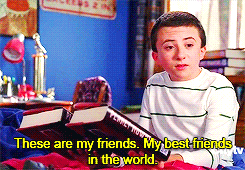
Fic Recs Wrap Up April 2024♡(੭ˊ͈ ꒵ˋ͈)੭*・:.。. .。.:*・゜゚・*☆
Mirror Mirror by epiphany_dex
Harry’s new year starts with a bang when he encounters Draco Malfoy at the Ministry Ball. Rec Post
(Never) Let Me Go by maraudersaffair @maraudersaffair
Harry and Ginny are married, but she abandoned him for her Quidditch career overseas. He is lonely and desperate for love and very interested in sleeping with a man. Then, one night at a party, Draco Malfoy whispers in his ear: Do you want to leave with me? Harry knows he should say no, especially since a scandal would ruin his chance at becoming Head Auror, but Malfoy is entirely too fit to pass up the opportunity. Rec Post
Another Mind Game by May_May_0_0
Harry’s occlumency reveals his disturbing home life which sets off a chain reaction that cannot be undone. Snape finds himself begrudgingly caring about the bespectacled boy, Harry discovers what it’s like to have adults who care, and Hermione finds herself becoming an accidental crime lord. Draco Malfoy is very much along for the ride, in all senses of the word. Rec Post
Dragons Don’t Know Paradise by teacup_tai @teacup-tai
In 2004, when Remus spends two scary weeks in the ITU due to complications of pneumonia and his HIV condition, Sirius walks around the house like a ghost and Harry finds comfort and strength in Draco through a chat in an online LGBT forum. Harry falls for him, but Draco has a lot of secrets and, before long, will need to come clean—even if he believes that no one is able to understand a dragon. Rec Post
Stalking Harry by orphan_account
Harry Potter is the most eligible bachelor in the Wizarding world. Draco Malfoy is a disgraced ex-Death Eater with emotional baggage and a bit of a crush. Rec Post
Through His Eyes (I Am Set Free) by Shewhxmustnxtbenamed @shewhomustnotbenamed
Harry and Draco have a telepathic connection that remains unexplained in both the Muggle and wizarding worlds. Draco is assigned a mission by Voldemort to locate and capture the Boy Who Lived– the trouble is that they don’t know anything about him. While Draco struggles to gather information on this mysteriously absent hero, he and Harry start communicating again for the first time since they were kids. Harry continues life as normal until he discovers information which compels him to abandon his ordinary Muggle life with the endeavor to rescue and emancipate his only friend– even if that means bartering with his own life. Rec Post
A Private Reason for This by Femme (femmequixotic) @femmequixotic
When the wife of a star politician in the Scottish Ministry turns up dead just outside Hogsmeade, Draco Malfoy and his murder investigation team are called in from the Edinburgh Auror force to find her killer. What DCI Malfoy doesn’t expect, however, is to have an ex from two decades past end up in his murder room, endangering not only his case, but also his heart. Rec Post
Consequences of Redemption by ominousflags @ominousflags
When Draco makes an impromptu decision to rescue Harry Potter from Malfoy Manor, the two find themselves completely alone and facing the looming climax of the war against Voldemort. Harry must start from the beginning with Draco–and starting over has more consequences than either of them anticipated. Rec Post
Double Trouble by multiverse_of_fanfic
Four years after the War, Draco is stuck in a dead-end job, paper-pushing his life away. Until one day, after a security breach in the Ministry, he receives an offer he can’t refuse. Thrown back into a world he thought he’d left behind, Draco must wrestle with his Death Eater past as well as his inconvenient — and forbidden — feelings for an annoyingly level-headed Harry Potter.
Will he manage to come out unscathed like he has most of his life, or will it all come crashing down? Rec Post
Here are a few more fics I've read recently that y'all might like to check out as well!(ノ゚∀゚)ノ━☆゚・*:.。. .。.:*・.*・。゚*:・゚✧
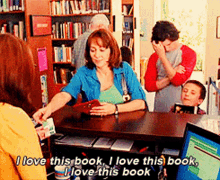
Weapons of Massive Consumption by SanderVanSunshine @sandervansunshine
Eight years after the war, Harry Potter lives a life of hedonism: raging parties, huge impulse purchases, and seemingly no worries. But it's Draco Malfoy—former Death Eater, lover of blueberry muffins, and bane of coffee shop workers—who starts to wonder if it's all a front, if something's actually terribly wrong with him. Why else would Potter ask Draco, of all fucking people, to write his biography?
What We Left Behind by peachydreamxx @peachydreamxx
Harry's recovering from an injury. Malfoy's recovering from heartbreak. Beaten down and bruised, Harry takes up Malfoy's offer to stay at his secluded seaside cottage in Dorset. It'll be good to get away from it all. It's only for a few days, and it's only so he can heal. Nothing else. Digging up past feelings will only make matters worse, and besides, Malfoy doesn't feel the same way. Does he?
Take You Home by lq_traintracks (lumosed_quill) @lqtraintracks
Everybody’s a little fucked up after the war, Draco especially. What starts as hate sex after a night out, eventually turns into something else, something more like comfort. And even though his friends all tell Harry he’s just being used, all Harry’s doing is making sure Draco gets home in one piece. He’s not falling helplessly in love.
Vipera Berus by Justlikewriting
Everything was fine. Draco resided at the Manor, made a decent living selling potions and most of his customers actually kept coming back despite his last name. Hence, Draco was fine. He really was. So what, if he was still waiting.
Title & Possession by Kbrick @kbrick
Harry Potter’s life is going well in the aftermath of the war. Sure, his house is dark and run-down and might hate him (while his house elf definitely hates him). But other than that, things are good. Except, yeah, okay, Hermione and Ron are no longer on speaking terms. Worse, they keep trying to get Harry to pick sides. But otherwise, Harry couldn’t be happier. Well. Except for the fact that Ginny is being super weird about their relationship and never wants to have sex or talk about the future. But other than that, Harry is perfectly fine, thankyouverymuch. At least, he is until Draco Malfoy sues him for ownership of Number Twelve, Grimmauld Place. Then Harry really isn’t fine at all.
( •ॢ◡-ॢ)-♡ I hope you enjoy these fics as much as I have! Happy reading, y’all! xoxo Carey (◍•ᴗ•◍)♡ ✧*💜💙💚💛❤💗💕💖
#Fic recs wrap up April 2024#Fic Recs Wrap Up#Drarry Fic Recs#drarry#Fic Recs#hp Fic Recs#harry potter#draco malfoy#hp#Harry Potter fic recs#Drarry fanfiction#Harry Potter Fanfiction#drarry fic#drarry smut#drarry squad#drarry fanart#hp fic#hp fanfiction#hp fanart#smut#hp smut#harry potter fanfic#harry potter fic#hp fanfic#HD Wireless 2023#Carey's Bookmark Fic Recs#carey's personal bookmarks#Long Post#My recs
74 notes
·
View notes
Text
Greta Gerwig’s 2019 “Little Women” A Slap in the Face of the Novel
My two cents on the 2019 movie version of this beloved classic by the novelist Louisa May Alcott, which was first published in 1868.
Warning: spoilers ahead.
For little tripping maids may follow God Along the ways which saintly feet have trod.
The novel is about four virtuous girls growing up while their father, a pastor, is at the American Civil War (1861 – 1865). We see them struggle with everyday life and with the particularities of growing up as well as the little or big drama that happen in their lives. Despite difficulties they always are a family. It’s their ties with other people as well as their faith that gives them strength and guideline, not any kind of ambition.
The book has strong morals, showing how good deeds are rewarded and bad deeds followed by punishment. Faith is a central theme, even when it’s not always harped on. Christian rituals and morals play a major role, beginning with the fact that the first novel both starts and ends on a Christmas day. The girls get gifted religious books, and they know The Pilgrim’s Progress so well that they make it a parlour game. Amy learns how to pray devoutly at her aunt’s house, helped by a French servant who is a Catholic.
The four sisters live by the standards of helping one another, in particular those in need. This is not a story about women pursuing their ambitions; they have „castles in the air” (chapter 13), but being good persons and always being there for one another is much more important for them than reaching personal goals. Beth carries this to the extreme when she gets ill taking care of the child of a poor family, and in the process gets so sick that though recovering at first, her health is so compromised that she dies young.
Their poverty is a major issue because it makes their sacrifice significant, e.g. when they bring their Christmas lunch to a family who is even poorer than them.
In the Gerwig movie version, the burdens they have to carry because they have so little money and must work for their living (which they rightly don’t enjoy) and because their father is at war are hardly to be noticed.
It is understandable if someone is not religious and therefore doesn’t appreciate the novel’s implications. But to take religion out of the equation in such a piece of fiction as this is like tearing its heart out.
The March sisters were supposed to be role models for girls, kind, virtuous and helpful. The book’s title is not there to belittle them because they’re female, but because it centres on four young girls, adolescents, no longer children but not adults yet; which is why their father calls them his “little women”. This movie made them „emancipated” modern girls, and that makes them detestable.
Meg
The novel told us how Meg, the oldest sister, went to a rich family to stay for a while, made a fool of herself, was disappointed by the frivolity of that life and turned her back on it. In the movie, her sister Amy accepts hypergamy after the novel had made a point of saying that family and virtue are more important than rank and wealth.
Jo(sephine)
In the novel, no one ever told Jo (or the other girls) „you can’t do this or that because you’re a girl“. Jo is a tomboy, but no one reprimands her for this. She is expected to mind her manners, yes, but not to change her nature and become more feminine. She moves to New York, works for her living, publishes her writing, founds a school, all with her family’s blessing. It’s ridiculous how this movie makes her a fighter for female independence.
Alcott’s Jo was much more a „modern woman” than Gerwig’s because she wrote novels, founded a school and also was married and had two sons. No one expected her to choose between a family of her own and a career.
Jo also said that if she was a boy, she would join her father in war. A few months in a trench would probably have changed her mind, thank you very much. Now that would have been an interesting direction to take a new movie interpretation.
Jo and professor Bhaer
In the novel, professor Bhaer’ criticism was not directed at Jo: he told her that young people should not read “such stories” without knowing that she was the author at that time. Jo had for a long time written sensational stories only to sell them, and Bhaer rightly pointed out that they did not have a good message for the readers. Jo understood that she could do better, and she did. He did not come across as offensive or mansplaining, or trying to discourage Jo from doing something she loved; he gave constructive criticism, and she was wise enough to take it. Why insert him in the movie at all in this case? Just to make Jo look better by seeming superior to him? In the 2017 BBC version, Jo accepts the criticism but also says that she writes her sensational stories because they sell and she wants to save money to take her sick sister on a vacation.
Jo’s rant „I’m sooo sick of being told this and that because I’m a girl“ is one of the many uncalled for scenes that did not appear in the novel with good reason. It’s petty and her wallowing in self-pity does the character no credit. Jo complains about feeling lonely, but it was one of the major points of the novels (there are four of them) that the March sisters are never lonely, whatever the trials they may undergo in their lives. Why did she tell Laurie that she won’t have him because she’s fine on her own then? In the novel, too, she rejected him, but she only said that they would not suit.
Jo and Laurie
Information has long since spread among readers that Alcott had to think up someone Jo would marry because apparently at the time, a heroine could not remain unmarried. She made Jo reject Laurie, disappointing many fans. In the movie, that is interpreted as Jo being „fine with being single”. Readers or moviegoers who expected them to be together in the end are called narrow-minded. Jo don’t need no man! She’s fine on her own!
But that wasn't the point. Readers didn’t expect Jo and Laurie to get married because they expected a heroine to get married to no matter whom, they expected it because the novel is very clear about how close they are. Jo and Laurie like one another from the start, share everything, Laurie compliments and encourages Jo always even when her family is not (e.g. when he tells her to have a run even if it will ruin her dress and hairdo). Laurie on one occasion kisses her, and on another occasion, Jo tells Amy that Laurie has beautiful eyes. Laurie is first depicted as being volatile and superficial, but he wises up and finishes his studies because he wants to be good enough for Jo. The two of them had the finest chemistry in all of the books. To me, it was plain that they belonged together. I was sorely disappointed when I read „Good Wives” and she rejected him.
Amy
In this movie, Amy tells Laurie that as a woman, she can’t earn her own money so she must marry well. At the same time, her sister Jo is in New York working at a boarding school to support herself, so that doesn’t make sense.
Amy is depicted as being „strong” here by „standing up” to Laurie who never had anything but kindness for her and, which is emphasized much more here than in the novel, she actually loves. She merely rejects him at first to „teach him a lesson” (an unneeded and uncalled one, but hey, he’s a guy so he must bleed for „all the wrong men do to women”). The little tirade she gives Laurie about „marriage being an economic proposition” because by law, her property and her children are his, is only spiteful. What use is it to tell that to today’s spectators, when things have changed long since?
If she wanted Amy to be a „strong woman”, why did Gerwig not make Amy a successful painter? If she did have to change major plot points, this would have been as good as another. What makes it worse is that Alcott had indeed drawn inspiration for her book from her own sisters: Amy was modelled on her sister Abigail who was a painter by trade, studied in Europe and later taught art to others, including prominent students.
Beth
If any of the March sisters was destined to remain unmarried, it was Beth; she’s content with staying with her family and never has any kind of romantic interest. All she wants is the comfort of her home, her cats and her beloved music. She would have been an excellent unmarried aunt to the March sister’s children had Alcott not decided to let her die (whatever her reasons). But of course, that can’t be. Not even in a modern movie version, no matter how you turn it upside down for the sake of „modern” messages to female viewers, can Beth survive and show that she’s fine without a husband. Because a female who doesn’t want marriage has to be a „strong, independent woman.”
~~~
Louisa May Alcott said that “I was born with a boys’ nature and always had more sympathy for and interest in them than in girls’.” Which is open to interpretation - maybe nowadays she would identify as a queer person -, however the character of Jo March is modelled after herself. It would have been more to the point to actually make a movie biography of the book author than ripping her most famous novel to shreds.
Women are better than men, I get it Greta. Some men may believe that they are better than women, but turning the tables on them doesn’t make things better, on the contrary.
I will reread the novel now to forget about this movie, thank you. P.S. Did this movie really win an award for “Best Costumes”? It’s cringe to see the girls wearing their hair open (!) in that time period, even worse when they’re at an actual ball.

#little women#louisa may alcott#abigail alcott#greta gerwig#March sisters#literary adaptation#saorsie ronan#timothée chalamet#emma watson#florence pugh#laura dern#meryl streep#the pilgrim's progress#religion#classic novels#feminism#anti woke#2019 movies#movie criticism#analysis#morality#christianity#christian faith#virtue#American literature
15 notes
·
View notes
Note
I wanna know what exactly was the deal with Charlie x Megan what’s their history???? Because it’s like sister Megan said they’re close friends but the diner scene started off awkward and then Charlie is rejecting her and then teasing her and then they end up fucking??? (Is that supposed to be their first time or have they done it before) And then after Megan got shot he’s all concerned and talked about their trips for wildflowers (how adorable and wholesome is that) and then they turn out to be partners in crime??? Were they partners after the diner talk? Because why else would you be theorising about the murders. Most of this taking place just between them btw and not Lois’s perspective. What. ((((Also I’m ignoring the twist/reveal the priest/nun verse is the real verse))))
HOLY CRAP! I’m so sorry for not answering this sooner! I’ve just noticed this… 🫣
So the whole thing with Megan and Charlie was completely fiction. A dream that Lois conjured up. Lois saw Megan as a nun because in her real life, the life outside of her coma, she saw Megan as a holier-than-thou person. Someone who was perfect and could do no wrong. Lois also saw Megan as the killer because Megan “usurped” Lois (Megan’s word not mine lol) in becoming Chief of Police, thus resulting in Lois retiring. I believe Lois saw it as a way of Megan killing her. Ending her life by ending her long career.
Lois saw Charlie as the killer because she heard what he said while she was in her coma. That whole speech he gave Lois’s husband about how it would be kinder to let her go, how death can be a tool for sweet emancipation. Which Lois was very clearly insulted by, that’s why she was always so cold towards him and immediately accused him trying to literally kill her.
Why she envisioned him as a priest… I’m kinda of confused on that part. I’m guessing since she had envisioned Megan as the nun it might have made sense for her to pair them up together in her dream state. Now how does that explain all the freaky stuff they were doing, especially the priest? My theory is that since Lois could hear Dr Charlie having orgies in her room and she heard the conversation about a doctor impregnating an unconscious patient that information influenced how she/we the viewers saw Father Charlie. As a doctor there’s a code of conduct they must follow, and as a Priest there are vows they have sworn to obey. We see both versions of Charlie going against what they’re both supposed to represent.
As much as I enjoyed the reveal about Megan being the freakin’ Chief of Police and watching her become a badass, I do miss Sister Megan! And I think that Father Charlie was waaay more interesting than Dr Charlie. I was hoping that there would be a relationship between Detective Megan and Dr Charlie, but unfortunately there was not.
I hope Grotesquerie gets a second season and I hope we get some Sister Megan and Father Charlie flashbacks 🤞🏼
#ask#grotesquerie#father charlie mayhew#sister megan duval#megan duval#charlie mayhew#grotesquerie fx
17 notes
·
View notes
Text
Fics Written In 2024 Masterlist
Adulting Sucks (ao3) - faewm T, 27k
Summary: 14-year-old Harry is off on a new adventure, but it’s not the drama kind. It’s one filled with budgets, rent, and taxes? Who said getting emancipated was fun? And he still has to deal with Voldemort. Kind of cracky and just a fun fic to fill the time.
A Flicker in the Dark (ao3) - antebellum13 Hermione/Draco E, 44k
Summary: Draco is imprisoned by the Order. Hermione is sent to interrogate him. Both are powerful Occlumens. Can she break him?
All These Winding Threads (ao3) - Anonymous Draco/Harry E, 35k
Summary: The tides of Draco’s accidental magic pull him under and leave him gasping. There’s a hungry ache that sits deep in his bones, growing worse every day. Soon it’s all he’ll be, a starving skeleton clawing at its throat.
He needs a solution. Unfortunately, that solution looks an awful lot like Harry Potter.
a soul with no king (ao3) - kashi_akarsaka1 G, 24k
Summary: “Hello,” Newt said, crouching down to her level but maintaining his distance. He set the translator carefully between them. “I'm Newt. I was hoping we might talk about your butterflies.”
Nyaring's hands stilled. “They don't mean to die,” she said quietly, the translator rendering her words with a slight delay. “They just want to dance with me. But everything that dances too close dies eventually.”
or: The story of Sudan, 1925.
Charlie Weasley and the Suspicious Rat (ao3) - hells_half_acre M, 25k
Summary: Charlie is just trying to get through sixth year and decide whether he wants to chase after a promising Quidditch career or pursue a summer internship at a dragon reserve. He doesn’t need to get involved with the twins’ latest torment of Percy, which for some reason involves accusing him of having a secret boyfriend named Peter… but there’s something about it that irks him, so, like a good brother, he intervenes – and accidentally changes everything.
Envy and Manipulations (ao3) - r_rrabbit Draco/Ginny M, 97k
Summary: Sixteen year old Ginny Weasley has her first summer job at the Folk Hills Country Club, the most prestigious high society club in the wizarding world. When Draco Malfoy comes home from his summer internship at the Ministry of Magic things get complicated, dark, and twisted. A chapter by chapter rewrite of my story on FF.
Harry Potter : Flash forward (ao3) - AbrahamSmith Hermione/Harry, Daphne/Harry T, 26k
Summary: A blend of the Reptilia28 and CoastalFirebird time travel challenges; Harry, Hermione and Daphne Greengrass die during the final battle and are sent back in time to set things back on track.
Hothouse Flowers and Hot Hot Showers (ao3) - azalea_larae, boshspice Draco/Harry, Parvati/Ron, Hermione/OC, Neville/Luna E, 101k
Summary: The eighth-year Muggle Studies class is spending five weeks at an American Muggle university. Harry’s assigned to room with Draco. And to make things, well, harder, there’s an inconvenient side effect to not using magic for a prolonged period of time . . .
Hurt Him and You Die (ao3) - maraudersaffair Draco/Harry E, 21k
Summary: Draco is a sexy mob boss. He is also the most powerful man in Britain. Harry is the poor uni student who saves his life.
Might as Well Face it, I'm Addicted to You (ao3) - ddelusionall Draco/Harry, Neville/Ginny, Neville/Harry/Ginny, Hermione/Ron E, 26k
Summary: After a curse knocks Harry out of the Aurors, Harry agrees to teach Defense Against the Dark Arts at Hogwarts. He somehow completely forgot that Malfoy is the Potions Master. And Malfoy is Hot. He can also help Harry with the curse by making a potion for him, but that’s secondary. Did Harry mention that Malfoy is Hot?
---
Harry has a physical disability in this fic, a curse that has made it very hard for him to do almost anything without pain. There is recreational drug use in this fic, but also brief mentions of a previous pain med addiction.
Harry and Nev kiss A LOT in this fic. Drarry is endgame, but I am a huge proponent of friends being able to kiss each other. Also, Nev is Hot.
Pink Aster - Days Gone By (ao3) - Anonymous Snape/Charlie E, 45k
Summary: Fire melts ice, or so they say. Severus just hadn't thought that that applied to the ice in one's soul as well.
Or When Charlie Weasley came to Hogwarts to accompany the dragons for the triwizard turnament, he met Severus Snape. But can a short affair turn into a lovestory?
Queen of the Weeds (ao3) - apliddell Draco/Harry E, 61k
Summary: The Wizengamot in its wisdom determined at his trial that Draco ought to return to Hogwarts to scrape together a few NEWTs and perhaps even a sense of community and fellow feeling amongst all the other children, rather ragged round the edges--and a good deal in the middle--battered and burnt and even orphaned in the war. And with a choice between the school he had outgrown and a cosy cell in Azkaban, Draco plumped for school.
Draco returns to Hogwarts for 8th year and finds himself a pariah. To his surprise, Harry Potter is the only person who seems to want anything to do with him.
Serpent's Heir and the Warden of Light (ao3) - zezedoesshit Hermione/Tom E, 312k
Summary: After the battle, Hermione Granger wakes up on a peaceful beach, caught somewhere between life and death. She meets Merlin, who shocks her with the truth—she’s his only surviving child. To stop the chaos that shaped her world, Merlin sends her on a mission back in time to Tom Riddle’s school days. With a year of magical training and ancient secrets under her belt, Hermione must prevent his descent into darkness. It’s a chance to rewrite history, but changing the past is no walk on the beach.
Tarry, Tarry, Wait For Me (ao3) - toomuchplor Draco/Harry E, 8k
Summary: "I can't ask it of you," Draco says, quick and awkward, "I just thought you should know, I thought you needed to know, but none of this is your fault."
"I'll do it," says Harry, unthinkingly. "Of course I'll do it."
Underneath it all, the truth is that Harry isn't actually being selfless or altruistic in any of this.
The Heart's Desire (ao3) - S4vvyg1rl Hermione/Harry T, 32k
Summary: What if a muggleborn witch had found Harry before the Durselys got the chance to take him in? What if he grew up in a happy home with his own friends and views of the magical world? Elise Clarke finds the young Harry and is visited by the spirit of Lily Potter who begs her to take him in as her own son. Find out how the Boy Who Lived fares with these new circumstances.
The Stowaway Malfoy (ao3) - writetimewrongmuse Hermione/Draco, Harry/Ginny, Theodore/George E, 143k
Summary: Rose Weasley and Scorpius Malfoy are on a mission to set up their parents. What better time to parent-trap them together than the week-long Christmas Holiday Hermione has been planning for three months?
You're Not Going Mad (ao3) - hogsheadandtum Luna/Harry G, 78k
Summary: Luna Lovegood wore to Harry that he wasn't going mad, but why does Harry feel as though she might be wrong about this one?
#wizardingworldlibrary#harry potter fanfiction#harry potter fanfic#2024 harry potter fanfiction#hp fandom#2024fics#2024 fics masterlist#harry potter#hermione granger#draco malfoy#luna lovegood#theodore nott#ginny weasley#george weasley#tom riddle#severus snape#charlie weasley#ron weasley#neville longbottom#parvati patil#daphne greengrass
7 notes
·
View notes
Text
'When it was announced that Andrew Scott and Paul Mescal would be starring as lovers in All of Us Strangers, a film written and directed by Andrew Haigh, fans were buzzing on social media about what the combination would deliver. This was no surprise: Andrew Scott – already a celebrated actor from roles such as Moriarty in Sherlock, the ‘hot priest’ in Fleabag, and Gethin in the incredible 2014 film Pride – and Paul Mescal (Normal People, Aftersun) are the definition of queer catnip. Under director Haigh’s masterful eye, the end product is an enthralling exploration of what it means to be queer in today’s Britain. Even ahead of its general UK release, the film has already made an impact and literally shifted the language we use about gay/queer representation on screen.
Haigh – acclaimed for past feature films Weekend and 45 Years, as well as HBO series Looking – has crafted a tender examination of love in the shadow of shame. An enigmatic dive into the pain and pleasure of finding affection in another man through the constrictive confines of emotional isolation, All of Us Strangers excels on so many levels.
The premise: forty-something Adam (Scott) meets Mescal’s twenty-something Harry, and the pair begin a love affair that has Adam revisiting his childhood home and conjuring up the ‘ghosts’ of his dead parents. And no, that’s not a spoiler, it’s just the opening scenes of a film that examines a love affair between two gay/queer men of disparate ages whose very different life experiences have brought them unexpectedly together. What happens next? Well, that’s for you to discover in a movie theatre near you. Essentially, All of Us Strangers is one of the most enthralling films of the 21st century to explore British gay identity, and Scott delivers quite possibly the performance of his career to date, one that dances between visceral suffering and emotional vulnerability.
Here, Scott talks to Attitude about bringing his character Adam to life on screen, working through shame, and the power of sex as a means of communication.
Cliff Joannou: A good place to start is to say that I really related to the film. I grew up in Croydon not long after director Andrew Haigh did, so the environment and era that it was set in really resonated with me.
Andrew Scott: You’re joking me.
For real. Even that shot with you as your character Adam walking through the Whitgift Shopping Centre, I was like, ‘Oh, that’s a little bit close to home.’ That’s exactly what it looked like when I was a kid. What resonated most with you in the story? For me it was very much the setting and location, being a young child in the UK after the worst of the AIDS crisis.
I suppose it was the dynamics within the relationships, that was what I found most authentic. And there’s two storylines within the movie, and both of them I found to be really, really beautiful and very actable. The scenes between Adam and his parents are genuinely extraordinary. And what’s so lovely is when I was in LA after the film had come out, and audiences had started to see it, and I’m really getting such a strong sense that people really do appreciate the nuance of the film.
I think the chief value of the film, for queer audiences particularly, is that it recognises that the dynamic within families isn’t always necessarily as dramatic, perhaps, as it is portrayed sometimes in stories about coming out, in the sense that it’s not fully embraced acceptance and nor is it outward rejection, but for a lot of queer people it’s somewhere in between, so that brutality and intolerance and doubt can exist alongside real love within families.
Absolutely. I like how frank the conversations are between Adam and his parents. I also like how early the conversation about Adam’s sexuality comes up with his parents.
What I love about that scene is that he doesn’t want to come out to his mum, he doesn’t want to have a coming-out scene. He’s a man in his forties, and he’s lived a life on his own for 30 years, so he wants to tell her about himself, and that includes, of course, him being gay, so he tries to be offhand about it, but also, I think my challenge was to show that he deeply cares what she thinks as well. And when she starts to be loud and wrong and reveals some prejudice in her questions, it enrages him.
But I think that exists alongside a real deep need for her to accept him, too. I think that scene is just so beautiful because it’s something, of course, that he’ll have thought about given the fact that he lost his parents 30 years ago. One of the things that I find really moving is when people talk about having lost their parents and never having come out to them before they died. I’ve talked to 60-year-old men who say, “I never got to do that.” And I think that really takes up a lot of people’s time.
Did you discuss with Andrew [Haigh] any of Adam’s wider backstory or did you create one for yourself? Where had he been in that time in between?
Not with a huge amount of detail because I suppose I thought of what benefit was that going to be. There were certain things I sort of thought about a little bit, but my biggest challenge, and all of our challenges, was to make those scenes as authentic as possible. We shot in Andrew’s childhood home, and that was such a brave thing for him to do. And I felt very much that if I were to think about any backstory, I wanted to think about my own; I wanted to bring my own stuff. To bring not necessarily my own biography, because it differs a huge amount from the character’s, but certainly my own emotional biography, as I call it.
It feels like such an extraordinary privilege to be able to play a character like this. And I wanted to give as much of myself because it was cathartic for me. I never thought that I would be able to watch a film like this, let alone be at the centre of it, so I wanted to be able to take that opportunity to express myself in some way. Why pick an imaginary backstory from somewhere else? I wanted to bring as much of myself as I could, because I feel like that’s what the audience is going to relate to the most.
There’s a bit early in the film when Adam meets his parents’ ‘ghosts’ for the first time, and he says, “Everything’s different now.” It’s such a powerful line as it highlights the character’s inability to let go of the past because doing so means he has to confront his present unhappiness.
Yes, exactly. Well, I suppose one of the best things that you can do as an actor is to say things to feel one thing but to say something else. That’s always what you want as an actor. A lot of the real interesting lines in the film are where people are saying one thing but meaning something else. When Adam says, “Everything’s different now,” I’m not sure that he fully believes that. He believes it in some way. But one of the things that I really love about the story is when Paul’s character of Harry talks about his estrangement from his family and he’s somebody who’s in his twenties.
I’m not sure the generational difference between Adam and Harry is the most interesting thing about the film. I think one of the big changes, of course, is the presence of Aids, when Adam would’ve been growing up. I certainly know that the shadow of Aids was very looming when I was growing up in the nineties. And, of course, that’s going to affect the way we think about sexuality in the sense that we’re going to feel like we’re going to be punished for being physical or for expressing love.
There’s another impactful moment where Adam says, “I thought if I fucked anyone I’d die.” It took me a while to get my head out of that space and allow my sexuality to be something that I enjoyed and recognise that it was not a threat to my life. How was your journey to finding peace with your sexuality?
Oh, it’s one of the wonderful things, the emancipation from that. I feel so incredibly… I suppose I just enjoy being gay so much on so many levels, I think it’s such a wonderful thing to me. It’s an extraordinary gift to my life and just to be able to see the real beauty in being gay is completely wonderful. The older I get, just the more I feel so lucky to have been born gay and that pervades my life in the sense of all my friendships. I have so many amazing queer friends in my life now that I just adore.
What’s very sad for some of us is that we avoid those kinds of people when we are shredded in our own shame. To be around other gay people highlights something that you don’t want to see, but when you do want to see it, it becomes completely wonderful. I feel such a huge sense of camaraderie with other queer people now, and without sounding too hippy about it, I feel like I just want to spread that love and positivity in our community because we’ve come such a long way, and it’s important that we are kind and look out for each other and celebrate how uniquely different and how fucking wonderful that can be.
That’s beautiful. I remember when I was younger and less comfortable in my identity, I avoided going to Pride, I felt it was a little bit too in my face. Now as I get older, I go there with my nieces, and we watch the parade, and there’s a tremendous sense of healing that comes with being around the community. And the broader the community gets, the more all these letters in that ever-expanding acronym stand out, the more beautiful it gets.
When I see two people of the same sex holding hands walking down the street, I’m like a little weirdo. I’m smiling at them. They’re like, ‘What’s that dude smiling at us for?’ Because I just think it’s so wonderful. It’s easy what you say about everything is different now. It’s something that I always feel when people say, “Oh, it’s 2024, you’ve got to get with the times.” I always find that preposterous because, and I mean this so vehemently, that different forms of sexual identity and gender identity have existed since the beginning of humanity. They have existed and will always exist until humanity ends. In 2084, they’re going to look back at us and think, ‘My God, those people were so old-fashioned.’ Sexuality, that’s not a fashion, it’s a natural state of being.
When I watch the relationship between Adam and Harry, there’s no point at which you feel like the sex scenes are being played for the audience’s titillation. It is one of those kind of rare sex scenes that actually drives the narrative forward, that it is important to the story.
Sex is just communication, isn’t it? It’s just physical communication rather than verbal communication. And what needed to be communicated is how I think we see Adam as somebody who hasn’t been touched by anybody or touched anybody in a long time, not just sexually, but he needs affection from his parents, and he needs love and sex and affection from his lover. And I think just seeing that tentativeness and the way Paul plays a character who’s a bit more sex-positive, so to speak… Their communication is really strong in that scene. I’m so proud of it. I really am because I feel like they represent the characters so beautifully.
How did you arrive at that point of playing those scenes in that way?
We didn’t over-rehearse it. We knew that those scenes, particularly the early ones, had to have a sort of frisson. And we had an intimacy coordinator, which can be very helpful for the simple reason that if you’re able to talk to somebody about your fears or what you want to show, what you don’t want to show, or what you think it should be and what the narrative of the storyline is, you have that base of safety. It actually makes you feel like you can do whatever you want. Because frankly, you just know that if there’s something that you don’t like, you’re contractually protected, and it won’t end up in the movie.
Andrew [Haigh] is really good. Sometimes when you do sex scenes, it can be like, ‘Oh my God, D-Day.’ And you are a bit nervous, of course, because you take your clothes off in front of strangers, but he’s like, “It’s just another scene,” so you don’t want to overdo it. But chemistry is a really interesting thing. You’re basically just listening to see what the other person is doing physically in the same way you would in a dialogue scene. And you can talk about that as much as you like, but until you’re actually there, it’s not alive in that way, so it’s just about listening, but just listening with your body, basically.
There’s a line in the film where Adam tells Harry, “Things are better now, but it doesn’t take much to feel the way that you felt.” Is there an instance where you remember, ‘Oh, that’s the first time I was made to feel shame?’
I don’t think that there is one particular point, but I do think if we could erase the assumption in our society that everybody is straight until proven otherwise, it would make an enormous difference to people. And by that, I mean that we don’t say to our six-year-olds, “You’re going to marry a princess, and have you got a girlfriend?” I remember when I was a teenager and people said, “Have you got a girlfriend?” I would say no, and I wasn’t necessarily lying, but you feel like you’re lying by omission.
For me, what happened is that you desexualise yourself slightly. And I think that what happens for a lot of teenagers is that there’s a conspiracy of silence around you, and that is a lonely place to be. And I think that’s where we become very hardworking, that we pour our energies into something completely different in order to correct what we imagine is a flaw in our character.
Some people go the opposite [way], where they become self-destructive; you can be super hardworking and incredibly ambitious, or you can just completely go off the rails. You think, ‘Well, I have been rejected, so I’m just going to go crazy.’ It affects our psychology in so many different ways. It may not necessarily be something that’s actually happened to us; it could be just forecasting what you think might happen, and that forecasting happens when we read about prejudice or other horror stories. The way the media talked about gay people when I was growing up was absolutely disgusting and fearmongering, and I still think we have to be very careful in not just the media, but in the way that we consume media and what we stand for. That we call out that kind of cruelty and intolerance. Language matters.
When we read the opposite, when we read positive things or see representation on screen, when we see ourselves, we think, ‘Oh, well, we can forge a way in the world.’ That’s why I think a movie like this, it is so incredibly important because it’s incredibly compassionate and tender, but it also doesn’t erase the fact that it’s painful and it can be lonely being gay. And there’s a certain thorny path that we all have to go to in order to find love, not just in another person, but in ourselves.
The clip from the Hollywood Reporter where you talk about the use of the term ‘openly gay’ went viral and has likely changed the way we refer to out queer actors in future forever. What went through your mind when you saw the reaction to that?
There’s something about that phrase that makes me uneasy about what it implies. Particularly now. You don’t put ‘openly ’in front of most attributes or characteristics. And I think we should maybe look at retiring it. And I know I’m not alone in that. The response to the clip reflects that. I do understand that historically we need a word to recognise the fact that there are sometimes people that are gay but for whatever reason aren’t able to be open about it. I totally get that. And so, I just feel the word ‘out’ does that. It’s just simpler. It does the job, and with less implications.'
#Andrew Scott#All of Us Strangers#Paul Mescal#The Hollywood Reporter#Andrew Haigh#Weekend#45 Years#Looking#HBO#Normal People#Aftersun#Fleabag#Hot Priest#Moriarty#Sherlock#Pride
7 notes
·
View notes
Text
Security concerns and commercial interests attracted the Ottomans to the region. In particular they were interested in slaves. The slave trade had always been important in the region’s economy, but it now became dominant. The Ottoman Empire, whose Islamic laws allowed the enslavement only of non-Muslims and encouraged the emancipation of slaves, was always in need of free labor. The Noghays and the Crimean Tatars responded to the demand, expanding their slave-seeking expeditions to the lands north of the Pontic steppes and often going much deeper into Ukraine and southern Muscovy than the frontier areas. The slave trade supplemented the earnings that the Noghays obtained from animal husbandry and the Crimeans from both husbandry and settled forms of agriculture. Bad harvests generally translated into more raids to the north and more slaves shipped back to the Crimea. All five routes that the Tatars followed to the settled areas on their slave-seeking raids went through Ukraine. Two of them east of the Dniester led to western Podolia and then to Galicia; two on the other side of the Southern Buh River led to western Podolia and Volhynia, then again to Galicia; the last passed through what would become the Sloboda Ukraine region around Kharkiv to southern Muscovy. If the demand for cereals led to the incorporation of the Ukrainian lands of the sixteenth century into the Baltic trade, their connection to the Mediterranean trade was due largely to Tatar raiding for slaves. Ukrainians, who constituted an absolute majority of the population of the steppe borderlands north of the Black Sea and moved into the steppes in search of grain, became the main targets and victims of the Ottoman Empire’s slave-dependent economy. Ethnic Russians northeast of the Crimea were a close second. Michalon (Michael) the Lithuanian, a mid-sixteenth century author who visited e Crimea, described the scope of the slave trade by quoting from his conversation with a local Jew who, “seeing that our people were constantly being shipped there as captives in numbers too large to count, asked us whether our lands also teemed with people, and whence such innumerable mortals had come.” Estimates of the numbers of Ukrainians and Russians brought to the Crimean slave markets in the sixteenth and seventeenth centuries vary from 1.5 million to 3 million. Children and adolescents brought the highest prices. The fates of the slaves differed. Most of the male slaves ended up on Ottoman galleys or working in the fields, while many women worked as domestics. Some got lucky, but only in a matter of speaking. Talented young men made careers in the Ottoman administration, but most of them were eunuchs. Some women were taken into the harems of the sultans and high Ottoman officials. One Ukrainian girl known in history as Roxolana became the wife of the most powerful of the Ottoman sultans, Suleiman the Magnificent, who ruled from 1520 to 1566. Her son became a sultan under the name Selim II. Under the name of Hürrem Sultan, Roxolana sponsored Muslim charities and funded the construction of some of the best examples of Ottoman architecture. Among these is the Haseki Hürrem Sultan Hamamı, a public bathhouse not far from Hagia Sophia in Istanbul, constructed by the best-known Ottoman architect, Mimar Sinan. In the course of the last two hundred years, Roxolana has figured as the heroine of novels and a number of television dramas in Ukraine and Turkey. To be sure, her life and career were the exception, not the rule. The Tatar attacks and the slave trade left deep scars in Ukrainian memory. The fate of the slaves was the subject of numerous dumas – Ukrainian epic songs that lamented the fate of the captives, described their attempts to escape from Crimean slavery, and glorified the men who saved and freed slaves. Those folk heroes were known as Cossacks. They fought the Tatars, undertook seagoing expeditions against the Ottomans, and, indeed, freed slaves from time to time.
Serhii Plokhy, The Gates of Europe: A History of Ukraine
2 notes
·
View notes
Note
Anon again, thank you for trying to allay my fears of a "Jimin desert." That was what you were trying to do, right? By raising the specter of another JK collab and album?
Gee, thanks. 😉
But your comment about Pdogg I did find controversial--and interesting. To me, FACE is a perfect album. I can't think of anything I'd want differently--except for it to be longer, of course.
But MUSE... we don't know yet. The concept photo this morning gives me hope, though. (So exciting!)
It's just that I already know there are two songs on MUSE I would probably skip after repeated listens. I don't skip ANYTHING on FACE. But then, I love the intense, the dramatic, and the misery. So that's on me.
In any case, do you have an idea for a different Jimin production team? He seems so comfortable with them and they work together so well. And Jimin is so loyal.
And he doesn't have anyone pushing/encouraging him in a different direction. Or perhaps he does, and we just don't know about it.
Thanks for the discussion!
Haha! Anon, were you looking to vent without comment? I'm sorry. I hate being on the receiving end of unsolicited advice, so please forgive me. But you and I both know more JK content is on the horizon because no way they invest so much into his solo career and then say nah, forget it.
I love a controversial conversation, so let's chat about Pdogg and why I don't want him on Jimin's future music team. Sorry, this is going to be long.
Let's talk about FACE first. Like you, I really love the album. There are three songs that feel strong and complete to me -
Interlude: Dive. A fascinating opportunity to be a fly on the wall on a day in Jimin's life. We go from mundane activities of daily life to the euphoria of being on stage and adored by fans to suddenly being deeply and utterly alone. Powerful.
Like Crazy. To me this is the most "complete" song on the EP. The synth pop sound goes so well with the concept of losing oneself in pleasure and vice. The lyrics are good, the use of Jimin's voice is good, and the music composition is interesting. Initially I was sort of put off by how often Blvsh and Chris James seemed to take credit for this song, but I suspect they have a right to.
Letter. This song is such a beautiful representation of what Jimin is capable of as a songwriter and as a singer. It's straight out of a romantic movie from the 1970's. It gives hints of Gordon Lightfoot, Jim Croce, and Cat Stevens. I love the strings, the acoustic guitar, the harmonica, the waves, but especially Jimin's soft, breathy whisper-like vocals. It's just a lovely love song.
I like the rest of the songs on the EP, too. I think Jimin's lyrics and vocal performance effectively convey anger and betrayal, loneliness, and eventually self determination and emancipation. Where I think the three songs fall short is with composition. They feel incomplete and a little amateurish. Set Me Free Pt. 2 is powerful and moving, but the song is too repetitive at the end. The performance, on the other hand, is unmatched.
Jimin is many things. He's an astonishingly talented dancer. He's a master of the stage. He's a great singer with a voice that drips with emotion when used correctly. But what he is not, is a trained composer/musician. This is a-ok, but it means he needs a great team of musicians to provide him with well written and fully realized compositions to match his fascinating narrative song-writing style.
I'm throwing out this example because I'm going to see Still Woozy in concert in a couple of weeks. Even if this isn't your style of music, just note how well all the instrumentation works together, how seamlessly the background vocals enhance the song, and how the tongue-in-cheek ad-libs and samples make the tune pop. Oh, and Sven (Still Woozy) records his music in his garage, not an ultra fancy music studio like Pdogg's.
I've spent a lot of time this week listening to Lie, Filter, Serendipity, and Promise. In all four of these Jimin solo songs, the compositions are so good and match the lyrics so well. Jimin's voice is used to the fullest, really relying on the power of his lower register and his techniques like growls and vocal runs. His high notes are used sparingly but poignantly. But when I listen to Closer Than This or SGMB, the compositions are just so flat. Where is Jimin's precious lower register? And what weird distortion are they doing to his voice on SGMB? Somebody is dropping the ball on these songs and I'm not ready to blame Jimin.
This reaction video strikes me as a fair review of SGMB. It's a fun, happy song, but there's basically no hook. It feels like missed opportunity. The track video is so well done, though. Jimin's creativity and charm really shines.
youtube
Like SMFpt2 and CTT, this song is repetitive. The refrain in the marching band horn section at the end is repeated 7 times. Yes, I counted.
In summary, the things that don't thrill me about Jimin's solo songs:
Too many high notes, not enough lower register and use of his vocal techniques.
Not enough background vocals or poorly done background vocals. Someone should go to jail for the bg vocals in CTT.
Overly simplistic compositions that lack tension and have too much repetition.
Jimin obviously feels comfortable and safe working with Pdogg and the rest of the SGMB crew. but I hope he eventually follows in RM's footsteps with RPWP (yes, he's on everybody's shit list today), hand selecting musicians and composers to work with who will push him out of his comfort zone and encourage him take risks.
It's really a pity that Jimin didn't get to see the response to FACE before he started recording MUSE. He's made several comments along the way that indicate he's really focused on making music that he believes will please the fans. In reality, what resonates with the fans is honest, sincere, vulnerable songs, like those on FACE. Not all songs need to be depressing, of course, but the sooner he gives up on being a people pleaser and instead hones in on the art of songwriting, the better his work will be.
Okay, thanks for sticking with me through this long post. Believe it or not I'm actually super excited to hear the rest of MUSE and I'm keeping an open mind.
5 notes
·
View notes
Text
The Hill Family - origins

Hii,
I started this family on sims 3, and when my game stopped working and I decided to give sims 4 a chance I just missed them way too much... so I remade them!
Most of their lore is from sims 3 so please ignore the extremely different genetics etc... (I tried my best lmao)
THE LORE
GEN ONE
The founders of this family are Ashton and Noah Hill.
The two of them met in university and quickly fell in love, getting married straight out of college.
Ashton received a job offer to work at the mayor's office in Salmon Woods and they both decided to move there since Noah's work as an artist was mainly at home.
Not longer after the move, Ashton was in charge of a fundraiser for a foster care home and that's when he met a little girl called April.
April was in foster care with her twin brother, Kai, and when she met Ashton she immediately felt a connection and made it her life's goal to get adopted by him. Kai, being very protective of his sister and hating every type of authority, hated the idea and hated Ashton.
After awhile Ashton realized April's plan and even though he knew Kai didn't like him he couldn't help but consider it, because he had so much love for the twins. That's when he decided to introduce them to his husband Noah, an artist with a great sense of humour and rebel ideas. To no one's surprise, Noah and Kai got along incredibly well and it ended up being Noah assuring Ashton that despite being very young they were ready to adopt the twins.
Life after that wasn't exactly sunshine and rainbows. They had to go through a lot in order to get the adoption and through it all Kai was very much still causing trouble, especially when it came to Ashton.

When they became teens April was a straight A student gunning for law school, while Kai became more and more interested in art like his father Noah. His relationship with Ashton grew stronger and even though they fought a lot there was a lot of love there from both of them. Kai started rebelling in other ways and turned his anger to his art.
Ashton then got a job offer in Evansdale County, and the whole family moved which was hard for Kai.
By the time Ashton and Noah were in their 30s and their careers were doing great they decided it was time to adopt again.
That's when Madelyn came into the picture. A sweet and shy girl that loved sports. The entire family describes her as a ray of sunshine.

As she grew up she started doing really well and was constantly winning school sports events and made it to the national football team by the time she was a teen.

After high school April was in university studying law and Kai started to really take his art seriously, and one of his favorite places to paint and draw at was the beach.
That's when he reconnected with Rachel Meyers. A girl he met when he was younger, in foster care, and that he had lost contact with after moving to Evansdale County.
Rach had moved to Evansdale after getting emancipated and got herself a little cabin on the beach where she lived with her dog while working at a local resort.
They crossed paths at the beach and started seeing each other all the time. As a result, Rachel ended up getting pregnant at 19. Ashton and Noah then decided to invite her to stay at their house and she lived there through her pregnancy and first few years of Summer's life, their daughter.

GEN TWO
Their relationship grew stronger and eventually Kai proposed to Rachel. And they bought a little house on the beach. Rach's dream had always been to live and raise her children by the water, while owning her very own waterside hotel.

Rach then got pregnant again, with their second daughter, Aubrey, and actually got married during that time, at the beach obviously.


The Hill family stayed very close even after all the siblings moved out, but shortly after Aubrey was born Noah ended up passing away.

During all of this April started her job as a lawyer and ended up meeting a business man with whom she had 3 children. Her oldest son, Dash, Cory and the youngest Nora.
Madelyn also had a child named Eva. And became a professional athlete.
(no sims 3 pics sry)
By the time Summer was a teen and Aubrey was a child, Ashton passed away and Kai decided it was time to finally change things up and pursue their dreams, wherever that might take them. Even though it hurt them a lot to leave Kai's sisters, they all stayed in constant contact and visit each other all the time.

Kai, Rachel, Summer and Aubrey moved to an island named Sulani.
(sims 4 transition)
On their first day on the island Summer met Enzo, her next door neighbour who lived with his grandmother. Their rooms ended up having windows facing each other and the two of them developed a deep friendship.

At some point, Summer began to notice things weren't exactly going well between Enzo and his grandmother and she started inviting him over often. Rach and Kai understood and because they are no strangers to rough home situations they allowed Enzo to basically live at their house.
Enzo became an honorary member of the Hill family, going to every family event.

He is, to this day, the most important person in Summer's life and she loves him but they refuse to make anything official because they would never want to mess what they have. That said, growing up they explored their romance every now and then, which led to both of them not being able to keep partners.

Much like her mother, Summer has always loved the ocean and now, living on the island, she started getting into surfing with her parents and later on started competing.

She won several championships as a teen and ended up landing sponsors.

Aubrey though, despite growing up on the beach, isn't really a fan of water sports or sand so she dedicated her time to learning about space and videogames.

Meanwhile Kai's sisters and their family's also moved around and Madelyn is currently a pro football player in San Myshuno where April also lives with her family and works as a lawyer.
Summer and Enzo both graduated recently and both decided to pursue their passions: surf and music.
Summer stayed on the island and moved in with some friends and Enzo moved to San Myshuno alone while the rest of the family is still living at the house.


A new chapter for the Hill family is now starting...
Generation 3 coming soon.
next
#the hills#sims 4#sims 4 family#sims 4 generations#sims 4 rp#sims 3 rp#sims 3 generations#hill family#hill legacy#sims 4 gameplay#sims 4 screenshots#sims 4 legacy#sims 4 generation#ts4 simblr#my sims#sims 3 legacy#sims 4 community#simblr
2 notes
·
View notes
Text
This continues the Wayne tradition of raising your found child with the man who raised you.
Tim brings Kon over to crash in a guest room after a mission.
Bruce: Is this our child?
Tim: Ha ha ha! Such a joker, Bruce!
Tim brings Bart over for a meal between missions.
Bruce: We have a baby?!
Tim: Ha. No. He has an actual family.
Tim brings home assassins and Bruce is pulled from the time stream.
Bruce: I understand that raising children is very hard, especially as an emancipated teen parent to children older than yourself and I would of course be willing to support you in everything you need just like Alfred supported me and that means-
Tim: NO, BRUCE!
Meanwhile Damian's at the manor with his fifteen fur and feather babies, passing bottles to Dick so he can feed the newest kitten.
Dick: You know I have a life and career of my own right?
Damian: Yes?
Dick: That means that I can't always be here to help you with the animals.
Damian: But you are their grandfather? And that means you must be included in their training, education, feeding, and other wellbeing.
Jason, who is having a staring contest with Jerry the Turkey: Dick's kind of bad at the dad thing. It's to be expected that he'd be bad at grandpa-ing too.
Dick, guilt ridden over both these kids and competitive spirit rising, lifts a kitten to his nose: You think I'm a good grand-dad don't you?
Kitten scratches him.
Imagine Dick actually adopted Jason. Like that's so chaotic— especially when Jason comes back from the dead.
12 year old Jason: Hey, Dick? Since I'm adopted by you, does that mean you're my father?
18 year old Dick: ...I'm still too young to called dad so no, I'm just your legal guardian.
Jason: Okay, dad.
Dick, tearing up: Please no.
——————
Jason after resurrection as Red Hood: I am your son.
Dick dating Wally: Tf?????? How would I— JASON?
——————
Bruce: All of you are my sons.
Jason: Technically, I'm your grandson.
Damian and Tim: ?????? What.
Dick: Technically he's right. You've been a grandpa since I was 18.
Bruce: ...Fuck, I forgot about that.
Damian and Tim: WHAT THE FUCK?????
——————
Bruce and Jason arguing:
Bruce: You're grounded!
Jason: TF? You're not my dad, Dick is!
Dick: Please, for the last time, I'm not really your dad.
Jason's dramatic ass: GASPS?! I'M ADOPTED?!
22K notes
·
View notes
Text

Camille Claudel and Bernhard Hoetger Emancipation from Rodin 06.06.2025 to 28.09.2025 Alte Nationalgalerie, Berlin
audioguide narrator: Edwin Alexander Francis
produced by: Orpheo Group (Berlin)

recorded at: StudioColosseo, Rome

For the first time since 1905, the Alte Nationalgalerie is holding a collaborative exhibition showcasing the sculptural works of two artists whose creative careers and life paths crossed several times in Paris: Camille Claudel and Bernhard Hoetger. Both artists are united by their quest for recognition and by their decision to break with the master of French sculpture, Auguste Rodin. At the beating heart of the Parisian avant-garde, both the French sculptor and her German counterpart, who was ten years her junior, developed an artistic vitality that would resonate around the world and is now being presented to the public again in a joint format after 120 years.
See photos in the official press release here ->
The exhibition Camille Claudel and Bernhard Hoetger: Emancipation from Rodin in the Alte Nationalgalerie showcases roughly 140 objects, 67 of which are artworks by Claudel and Hoetger, with numerous items on display that are on loan from a range of international institutions, in addition to works from the Alte Nationalgalerie, the Kupferstichkabinett and the Kunstgewerbemuseum.
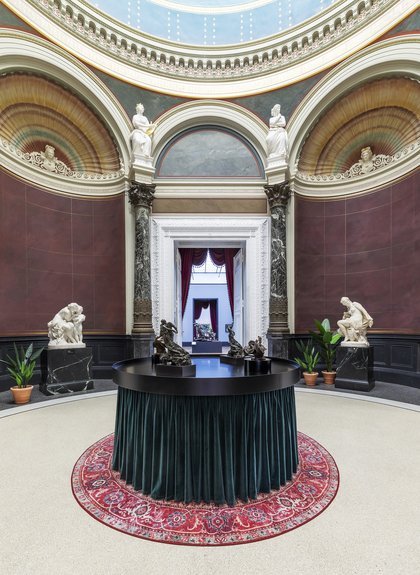
View of the exhibition Camille Claudel & Bernhard Hoetger in the Alte Nationalgalerie ©Nationalgalerie/David von Becker
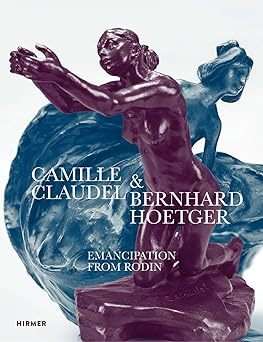
0 notes
Text
Courtesy of Musical Milleus
To all highly talented musicians throughout the world who have been studying and playing music twelve hours a day since the time they were two, we'll be open soon. Introducing an entirely new groundbreaking revolutionary musical collective like no man has ever seen set up to generate the careers of up and coming musicians giving them maximum visibility while enhancing by a long shot the careers of established musicians. It's a musical collective destined to be known as the Avatars of Lord Shiva.
To let you in on who Lord Shiva is, one in three within the fabric of the triad of deities, Lord Brahma, Lord Vishnu, and Lord Shiva. Lord Brahma is the creator, the grand conceived. Within the boundless body of Lord Vishnu all macrocosms to be begin as blank slates of creation which are filled in by Lord Brahma. Infinities of infinite macrocosms spring forth from the boundless body of Lord Vishnu and once manifested very macrocosm stands as an eternal timeless ashram which has always been there, Lord Brahma the point of creation with Lord Vishnu as the preserver of all macrocosms. Lord Shiva is the destroyer and overseer of dissolution making way for new beginnings.
By joining this groundbreaking revolutionary musical collective you will effective immediately be making way for new beginnings within the fabric of the global musical renaissance. You will be granted moksha, emancipation and liberation from suffering, the crown jewel of discriminatory reasoning. You'll be in oneness with Brahman which is eternal bliss. You will have achieved the carnival effect whereby the multiverse bardo loka continuum will become comparable to one grand amusement park. You will have full control over who you will be in all your future lives with every life you live another ride within the fabric of the grand amusement park. Every life you live you will be an avatar, a spirit in moksha descending upon the Earth to guide humanity along a fruitful path.
To be down to Earth you will have top notch representation in your musical careers both in this life as well as all your future lives within the fabric of all macrcosms you so chose to inhabit throughout all time spreading the joy and power of music throughout all existence. This is a call for compositions which are far more than compositions but musical journeys with open ended free flowing instrumental rifts without repeating the same note twice with interchanging beats and sound effects. Embrace the challenge of crafting forty minute musical odyseys with gothic, melodramatic, euphoric, eerie, enchanting, haunting, or mystical melodies.
You will be sharing an instrumental role in cultivating all genres of trance music the music of the future to it's full potential with a vibrancy an intricacy equal to that of Indian ragas, Indian classical, and Indian jazz. You're all invited to collaborations on the structure of entirely new musical genres, structure of compositions inspired by Hindu deities, or my countless song lyrics on my profiles on Linkedin and Twitter. What you can also collaborate on are my well over a thousand AI generated three minute musical tracks on my Brahma Shiva playlist at Riffusion. For any on these my wishes are for fifty percent copyright and upon three million in sales a $50,000 deposit. You also share the option of compositing entirely from scratch. Once again you will have top notch representation. Tance music will give an entirely new meaning to symphonies, perfect blend of traditional instruments the likes of the guitar, sitar and violin along with synthesizer, high tech sound pads and drones.
Between now the time the website is up and running make yourselves familiar with musical styles the likes of Jean Luc Ponty, L Subramanium, Tetouze, Mercan Dede, and Susheela Raman. Every one of their musical works they get it down to an art setting an example of what high quality composition can become. Become familiar with music theory principles of Indian ragas, Indian classical, and Indian jazz. Other prerequisite is successful completion of five or more online courses from a musical school in India. Once the website is up and running membership is an annual $300.
0 notes
Text
Blood and Snow: The Fall of a Dynasty
Yekaterina's lineage constitutes a fascinating account of reinvention and resistance, defying the historical weight of a name intrinsically associated with both opulence and tragedy. As a descendant of the Romanov dynasty, his story finds a significant breaking point in the figure of Alexei Romanov, younger brother of Tsar Nikolai lI, whose trajectory became a landmark of ideological and historical transformation.
From his youth, Alexei demonstrated a restless spirit and was deeply dissatisfied with the structural inequities that sustained the autocratic regime. Driven by a fascination with the progressive ideas that were buzzing in clandestine intellectual circles, he became close to renowned revolutionary figures, such as Vladimir Lenin, with whom he shared a friendship and a vision of social justice that transcended ideological barriers. For Nikolai II, the revolutionary movement was an existential threat to the monarchy; for Alexei, it represented an invaluable opportunity for emancipation for the Russian people.
With the advent of the Russian Revolution in 1917, Alexei assumed an unequivocal position, standing out as a financier of Bolshevik groups and as the author of manifestos that denounced the foundations of the monarchical regime. This stance aggravated tensions within the Romanov dynasty, culminating in his arrest, ordered by Nikolai II. In an extreme gesture, aiming to ensure the maintenance of the throne, the tsar ordered his execution, publicly disguised as an accident. However, Alexei's closest people, including Lenin and his wife, Sofia Ivanovna, knew the true nature of what happened. For Lenin, Alexei's death not only reinforced his revolutionary momentum, but also became a personal matter of revenge against the monarchy.
Sofia Ivanovna, pregnant at the time of the tragic event, went into exile in Western Europe, taking with her the memory of Alexei and the son she was carrying. This one, Andrei Alexeevich Romanov, grew up in exile, being educated in France and, later, in England, where he became an intellectual committed to socialist ideals and the anti-fascist struggle. He later married Irina Vasilievna, also a Russian exile, and together they built a family that perpetuated the progressive values and rich cultural heritage of their origins.
The first-born, although bearing the Tsar's name, a choice filled with bitter irony considering the historical weight of his lineage, was in reality named in honor of Irina's father, Nikolai Vasilievich, a man of remarkable virtue and widely admired, whose life was tragically taken during the Revolution. This son, Nikolai Andreevich Romanov, stood out as an eminent sociologist, dedicating his career to the in-depth study of authoritarian regimes and their social implications. His sister, Natalia Andreevna Romanova, established herself as a highly respected intellectual, serving as administrator of the Saint Petersburg City Library, being widely recognized for her literary studies and work preserving historical manuscripts. Viktor Andreevich Romanov, the youngest brother, chose to pursue a scientific career, receiving international recognition for his significant contributions to the fields of genetics and molecular biology. Yelena Andreevna Romanova, in turn, stood out as a painter of unique talent, in addition to teaching as a professor of Art History at one of the most prestigious universities in the former imperial capital.
Nikolai married Anna Petrovna, a historian of high academic reputation, with whom he had an only daughter: Yekaterina-Elizaveta Nikolaevna Romanova, heir to the idealistic and revolutionary spirit of her descendants.
0 notes
Text
Yours truly embarks on wild goose chase after elusive pot of gold
alternately titled: incorrigible lottery dreamer big plans to relocate self and spouse
to some tropical island paradise by the dashboard light
(the above line credited to musician named Meatloaf) upon arrival of Stanley steamer. When my ship comes in loaded and laden with precious cargo from busy ports far and wide captains trumpeting their arrival donning sunglasses traipsing incognito yours truly spied at merchants wares cast dark shadows
from the outer limits at noontide. A fool's errand finds me emptying out billfold, while being gagged and bound with a blindfold
My blood runs cold My memory has just been sold My angel is the centerfold steaming with madness analogous to exhaust or intake manifold, especially as the winnings increase ninefold videre licet building castles in the air courtesy precarious scaffold
tumbles down into a bajillion little pieces untold. Paradise visage and eyes a bulge with dollar signs whets imagination with Mega Millions ticket bought for potential wealth overtakes rational self with delusions of grandeur caught allow, enable and provide flirtation with fate to experience rich draught envision emancipation proclamation and utter premature ejaculation from penury a distant battle fought
expect the usual outcome after next drawing to yield monetary naught temptation for instant millions eagerly sought human foible to reach until life lesson taut for elusive pot of riches streak of universal desire and tacked clear of shoals, where hand to mouth hardscrabble existence wrought. This poor man's pipe dream nsync with the milkmaid and her pail, where fanciful notions pluck me out being day late and dollar short essentially pennilessness in the extreme story of mein kampf fortune teller also known as Zoltar speaks machine said contraption did foredeem substantiated, kickstarted, corroborated... courtesy an archenemy Joaquim (fiend nixed) and his tall sidekick Kareem both rogues could shine figurative longerbeam and discern mine ill fate, Meanwhile creative endeavors and linguistic pleasure thru the literary attempt suitably with my poetic side
third eye blind (living a life of total focus on the empty, finite lusts of the material world, instead of on the promise of eternal realms of life hereafter) palliative, yet less rewarding versus garnering large sum of money would be a dog send
delivered by one blessed angel in disguise redemption and salvation assuage temptation considered thankful find with challenges or commiserate and complement via words of positive kind feeble attempt where words synchronize readers may espy hidden puns within this rhyme lined to pry poem or prose from mind deliberate semblance to communicate and extract idea from cranial rind analogous how stitcher doth tightly wind a tapestry of rich and royal hue. No..no...no...DON'T GET CLOSE cuz, yea...yea...yea... I suppose mailing altruistic donation would be the safest lagniappe bet, where over exposure would most likely NOT infect thee, though these really quirky, phony (funny) germs can be inhaled across transmission wires thru the nose or data packets
bounced off satellites as telecommunications specialists worth while (and/or) even if I fall precautions taken even extreme measures such as cryogenics, (where an individual ideally after they die) doth get froze, nonetheless this communiqué must be heeded cuz most effective,
and best assimilated before one takes a doze essentially (non fatal) lottery mania flow within my entire being from head to toe fungus infected what this old rattletrap specs castles in the air akin to a house of cards careering into scattered mess (resembling 52 pickup), thus unknown reader
dune hot dare casinos, gambling halls, horse racing, et cetera lest ye contract an immobilizing, yet fearless innocuous diagnosis, buffer in themselves with aspirin do sing glaring bug eyes, plus affecting a hair styled, and swiftly tailored demeanor accompanied with Scrooge
(tiny timid lee)
intimating lurching, and ogling qua monopolistic greed
expending every last red cent indeed finding one impoverishing themselves
at reo wagon light speed, especially after getting flying high courtesy stone temple pilot buzzfeeding me with weed.
0 notes